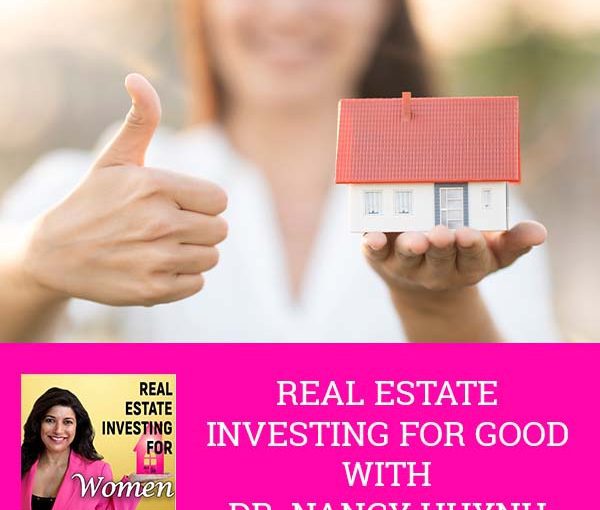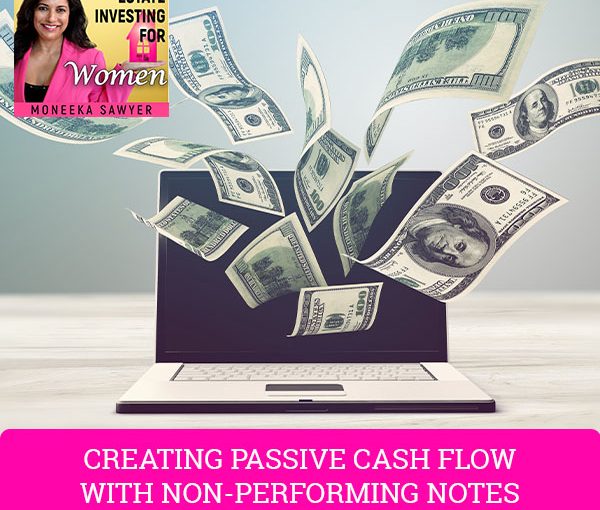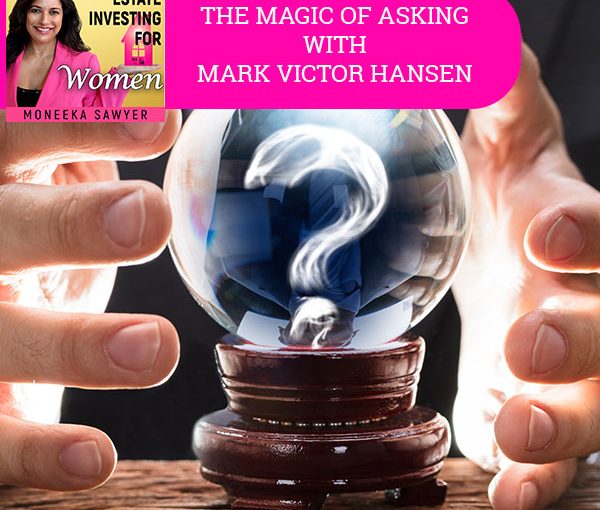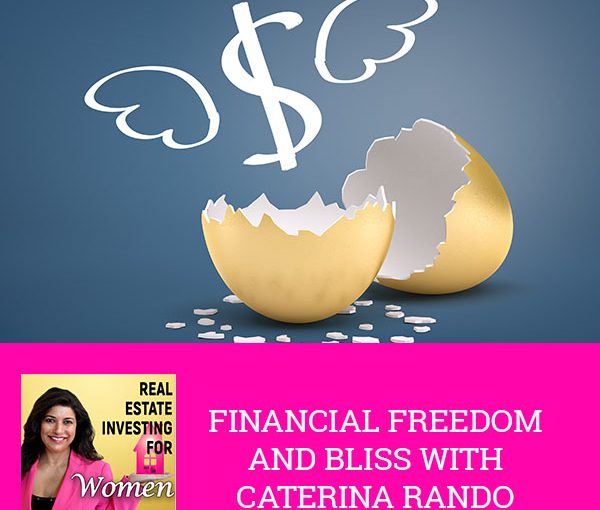Become the Bank for Passive Real Estate Income – Buy Notes
Moneeka Sawyer is often described as one of the most blissful people you will ever meet. She has been investing in Real Estate for over 20 years, so has been through all the different cycles of the market. Still, she has turned $10,000 into over $5,000,000, working only 5-10 hours per MONTH with very little stress.
While building her multi-million dollar business, she has traveled to over 55 countries, dances every single day, supports causes that are important to her, and spends lots of time with her husband of over 20 years.
She is the international best-selling author of the multiple award-winning books “Choose Bliss: The Power and Practice of Joy and Contentment” and “Real Estate Investing for Women: Expert Conversations to Increase Wealth and Happiness the Blissful Way.”
Moneeka has been featured on stages including Carnegie Hall and Nasdaq, radio, podcasts such as Achieve Your Goals with Hal Elrod, and TV stations including ABC, CBS, FOX, and the CW, impacting over 150 million people.
Real Estate Investing For Good With Dr. Nancy Huynh – Real Estate Women
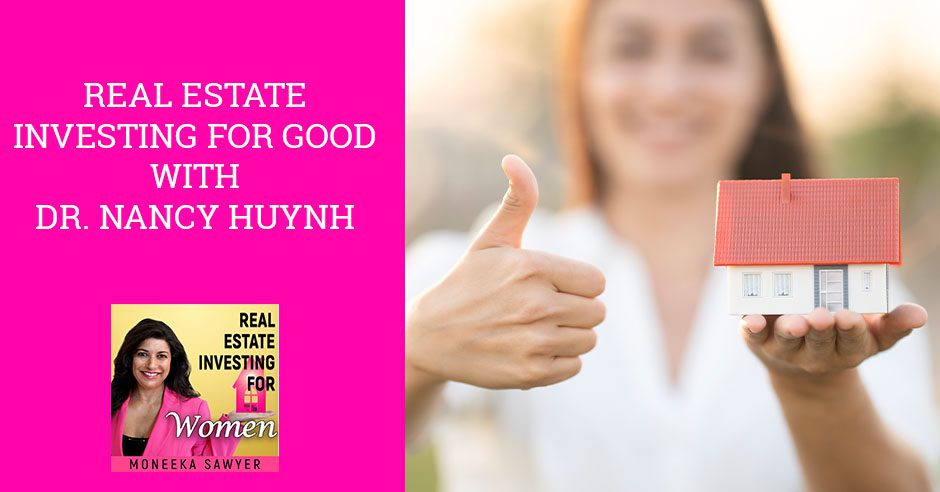
Many investors are in real estate as a side hustle and to create passive income. But how do you know when it is time to finally start settling in the industry for good, taking a more active role in achieving financial freedom? Eye surgeon and impact real estate investor Nancy Huynh, MD, helps us answer this question as she joins Moneeka Sawyer in this episode. Nancy founded Clear Vision Investing to help others, especially physicians, realize the power of real estate and achieve financial security. She tells us how she does that while sharing her own journey to investing and getting in syndications. Extending her success to others, Nancy then discusses investing for impact. She talks about her mission with real estate to help cure preventable blindness globally. Follow along with this impactful conversation to learn how you can achieve financial freedom and help others at the same time.
—
Watch the episode here
Listen to the podcast here
Real Estate Investing For Good With Dr. Nancy Huynh – Real Estate Women
Real Estate Investing For Women
I am so excited to welcome to the show, Nancy Huynh. Nancy is a Physician, an Eye Surgeon and Impact Real Estate Investor. She started investing in real estate to create passive income, hoping to regain control of her time and stop trading time for money. She founded Clear Vision Investing not only to grow her own portfolio but also to help others realize the power of real estate. She’s passionate about helping others, especially physicians, gain financial literacy and achieve financial security through real estate investing.
She believes that financially intelligent physicians can change medicine and the world for the better. As an impact investor, Nancy believes that real estate investing can deliver attractive financial returns while also making a positive social impact. I believe that too. Part of the profits from her company is donated to giving the gift of sight to someone in need and to cure preventable blindness globally. Nancy, that sent shivers down my spine and all over. What a beautiful bio and a beautiful mission. Welcome to the show.
Thank you so much for having me. I’m so excited to be here with you.
It’s so funny, Nancy. We think of doctors as rich and smart. Many people think of them as pompous. They think they know everything. My mom’s a physician, so you know, I know the way the world perceives. We need our doctors and there are all these opinions. What’s so interesting is we never think of a physician as needing financial literacy. I know from personal experience because my mom is a physician, so we hung out with a lot of them. They make a lot of money. They also have this huge social expectation to live up to. They spend so much of that time, first of all, serving their patients but then also feel it because they’re of service. They come to the world of service.
That’s what physicians do. They also feel that they have to live up to the expectations of how people see them. They put so much more importance outwardly. They don’t have the financial of literacy to create a life that then can be bigger than themselves. It’s so awesome. We’ve had one other doctor that’s doing a very similar thing on the show. I love what you’re doing for these people that serve us, serve their communities. They go through this huge education. They go through their residencies.
They sacrifice so much to be able to be of service then their lives get so tied up that they never get to retire or never get to get the freedom of time with their children and their families and the things that are important to them. Good job. To expand it to something even bigger than that, to be even bigger service to the community in different ways. Thank you for that.
Thank you for that perspective. You hit it right on point. Physicians were so used to sacrifice. Sacrificing our twenties and often our early thirties or even later, sometimes many years to get into this profession and become that attending physician. Through that process, we also financially accumulate a lot of debt. A lot of us graduate with over six figures of student loans from college and med school. When you’re in residency, you’re earning less than minimum wage for the amount of hours that you work. You start off with this negative net worth and all of a sudden, as you said, society expects you to live up to this expectation of this doctor image, the big house, the cars, the private schools.
People often get caught in the cycle of where they’re working and they’re making good money, but they’re chasing a hamster wheel. They never, as you said, experience that financial freedom but also that time freedom and, eventually, that geographic freedom, freedom of relationships and freedom of purpose to do what you want to do.
It’s so sad. This is true in many professions. Not just with physicians. I’ve seen it with vets, with dentists, in all different professions, whether it’s healthcare or not, where people sacrifice so much and end up in a place where they don’t get the freedoms that will make their life blissful. It’s amazing. Tell us a little bit about your journey, like how did you get from being physician to real estate investor? The two-minute high level, how did you get here?
Briefly, I’m a child of refugees. My parents came here after the Vietnam War in 1980. I was the first in my family to be born in the US. Unlike many children from immigrant families, were taught, “Study hard. Go to school and get good grades. Go to a good college and get that good job.” I followed this very prescribed path and along the way, I fell in love with medicine. That’s what I did. I went through medical school and fell in love with eye and ophthalmology and eye surgeries and giving the gift of sight. After I got off that training, I started working.
This is what got me. I realized, “I’m making pretty good money,” but the one thing I could never make back was my time, the one non-renewable resource. I could never get back and this especially hit home. I already had this feeling, but this especially hit home when my daughter was born. I remember she had a 103-degree fever and I had gone back to work after maternity leave. She was probably three or four months old.
The nanny called me and was like, “Can you come home? I’m not sure what to do.” I remember looking at my clinic schedule and I was like, “I cannot because I can’t cancel on these patients. I’ll be home as soon as possible.” I remember that feeling I was serving everyone but the one thing that I want to do now, which was to be with my daughter to figure out what was going on. I couldn’t do it because I didn’t have that time freedom. That time, I realized, was more valuable than anything. That’s when I thought to see what I could do. I discovered this thing called passive income and through that, I discovered real estate. That’s when I was off to the races with real estate.
What you talk about is that passive income creates optionality and choices. I don’t know if you’ve ever seen my TEDx Talk, but it’s all about choice creates happiness. Choice gives you time freedom. Choice gives you the relationships that you want. I love your perspective on that. Could you talk a little bit about that?
Money can’t buy happiness in and of itself but advise you that optionality, as we’re talking about. Once you take that financial burden off of you, you’re a little freer to say, “Now I don’t need to trade my time to earn this paycheck, to pay the bills, to pay the mortgage. What do I do with that time?” Sometimes it means I want to work more. I want to be more patient. I want to do more surgeries, but the freedom of saying it’s my choice to do that is different than saying, “I have to do it.”

Real Estate Investing: The freedom of saying “it’s my choice to do that” is different from saying “I have to do it.”
I think that’s the key distinction that I want your readers to know. It’s different when you’re doing something, but you feel like you have to do it versus, I’m choosing to do it. It might be the same thing, for instance. I could do twenty cataract cases, but it’s one thing to say, “I have to do it because I have to earn this amount of money to cover these expenses.” Versus, “I choose to do it because I love it. I want to help these patients.” It brings a completely different viewpoint and it’s so freeing.
It also helps to shift your identity. I’ve got a similar story. My husband and I were trying to get pregnant. We were going through the fertility thing and I had had eleven miscarriages and we were on our 12th pregnancy. I remember one morning. I went to my doctor to do my ultrasound and we lost the heartbeat that morning. I remember bawling in the little white room that I was sitting there. The doctor left to give me a moment. I cried and cried. I called my husband and I said, “We lost the heartbeat. I need you.” It was about 11:00 and he said, “Sweetheart, I’ve got meetings all day. I’ll be home at 4:00.”
He wanted to be there with me and I knew that. It wasn’t his fault, but I think for him, he also realized, “I want to be able to be a yes. My identity as a software programmer is not as important as my identity as husband to Moneeka.” It was an interesting shift from being professional, this is how I identify myself and this is my value to, I want to be a choice for this. I want to be a programmer because it’s fun. That’s when he got involved. He’s still not hugely involved in my business but got his buy-in.
We need to create enough passive income so that if you decide that you don’t want to be a programmer anymore, you don’t want to be tied up to a job, now you can do that. When you’re doing it, it’s because you love it, you’re passionate about it, not because you have to. It’s this idea of creating the passive income to become job optional. Not necessarily retire. I say retire and all my stuff because it’s an easier way to say. It sounds better than job optional, but what we’re going for is being able to create the bliss in your life that you’re searching for. That may be continuing to work.
I think for a lot of us, it’s going to involve some work. Whether it be, “I want to stay home more with my kids.” Being a mom is a lot of work. I have two young children so that in itself is work. You get to choose, as you said, what your identity, what title you want to choose and it could be fluid, but then it becomes your choice. Instead of saying, “I have to be changed to this 9:00 to 5:00 at this desk because my employer told me I have to. I have to get that every two-week paycheck. I have to be this identity from Monday to Friday from 9:00 to 5:00.”
What if you have those options with passive income to say, “Monday and Tuesday, I want to be a doctor. I want to be a surgeon. Wednesday, Thursday and Friday, I want to be a mom or I want to be a real estate investor or whatever you want to do.” It gives you a lot more choices. The flexibility of having options is what frees the mind. I think when people get stuck and feeling like they’re “trap” is when they don’t have options. If you have ten options, even whatever problem you’re solving, it doesn’t seem like a problem anymore, then it’s very freeing.
The flexibility of having options is what frees the mind. Share on XIt may feel like a challenge, but you have more confidence. You have more emotional and mental and creative confidence that you can get through it, get to the other side of it. Do you think anybody can invest in real estate?
I do.
Tell me about that.
I knew nothing about real estate other than buying a primary home. There’s so much out there now, so much education. Maybe it was different years ago. I don’t know. I didn’t look way back, but I’m sure if there’s a will, there’s a way. Especially in this day and age, there are podcasts. There are free webinars, a bunch of events that you could go to. It’s a matter of getting educated but also getting your mindset right.
A lot of the roadblock to people starting in real estate is in their minds and the mind games that they play themselves with. As Tony Robbins likes to say, “80% of success is psychology or mindsets and only 20% of strategy.” If it were all strategy, then all of us would have six packs. All the librarians would be billionaires with all the books that they consume. It’s not just the knowledge. It’s also knowledge of your mindset and with action that you could make it happen.
I’ve been calling mindset the ultimate strategy. It is a strategy in and of itself to get that under control.
A lot of the mindset, as we were talking about before, it is the identity you choose for yourself and the stories that we choose ourself. As women, how many stories do we tell ourselves that are not necessarily true or that we think it’s true, then we found so much evidence to reinforce it, to say it’s true when it’s not?
I always tell people everything that’s going on in our lives, we’ve made up anyways. We make up the story. The circumstance happens and three different people will see it in three different ways. You’ve made up your story about that circumstance. Why not make up stories that support you and make you and uplift you and give you those rose-colored glasses that will make life easier and more blissful. Rather than making up the stories about strife and difficulty and challenges and exhaustion and all of those things?
The fact of the circumstance, it’s how we view, as you said, through our colored lens or no colored lens. That’s how it shapes our perception and our thoughts of it. Our thoughts ultimately shape our actions, which lead to our results. That’s why it all starts with mindset. It’s circumstance but then the thoughts we put on it, which ultimately drive our actions then our results. It’s all in what story you want to tell ourselves, like when we’re little girls. Some of us tell ourselves these fairy tales. Why can’t we dream like that anymore? We can.
Our thoughts ultimately shape our actions, which lead to our results. Share on XTalk to me a little bit about the difference between active real estate investing as opposed to passive real estate investing because you’ve chosen passive. Talk to me a little bit about how you see those differences.
I think it’s a spectrum of active versus passive. Oftentimes, we make this clear divide, but it’s not necessarily soul. It depends on your circumstance, what you want, and what your goal of investing is. I’ve done both. I started off active like many people do that we think of real estate investing, which is to buy a single-family or a duplex and rent it out, which is what I did because it’s what I knew and what I was comfortable with. With comfort gives certainty and it makes you take action. I’m so glad I did that.
As I started building up my portfolio, I first self-managed my first one and quickly realized it was not worth my time. My time was better spent with my children, taking care of my patients, so I quickly handed off to a property manager. Even with a property manager, the decisions always float up to the top. I get calls about it. The other thing about active is you are the one who has to go source the property. Go find it, put in the offer and you might not win it. It does take time to find the property and get it under contract and all that.
Even for a property manager, it still requires some of your time management. I’ll give you an example. I was at the park with my daughter and I get this call from the property manager. They’re like, “All the water has backed up into both bathrooms into this property.” I was like, “Okay.” He’s like, “Don’t worry, I’ll get it all taken care of,” but you worry. You can’t not worry. The sewer had backed up. Instead of spending that afternoon with my daughter, I was like spent on the phone texting and calling.
That’s an example of what I found wasn’t quite fitting the lifestyle that I wanted at this time. That’s when I discovered passive investing. Passive investing with syndications, for those of us who don’t know what syn occasions are, it’s basically a group investment, instead of you taking your $100,000 and buying a single-family home, for instance. You could take that $100,000 and pull it with a group of people to buy a $10 million apartment building. No one person can probably have that huge down payment or that money to buy that apartment but as a group, you can do that.
I’ve shifted to the strategy for several reasons. One is my time, as I said. Even if I had the time, I didn’t necessarily want to spend it working in a real estate business, doing all the properties I wanted to spend time with my daughter, being the best surgeon I can, and honing that craft. The second was I could leverage a professional team who do this full time and leverage their network, their time, their expertise.
The third thing that I saw was I’m able to diversify because when I was buying my own active properties. I like to see and feel and touch it. I invested in my backyard here in Atlanta. I was pretty confined in terms of market, but now, I get an investment in the South, the Southeast and the Midwest. I could also diversify. I do mostly multifamily, but I invested in hotels and other commercial properties. You get to spread your money across different sponsors as well because you could put $50,000 here, $100,000 here and spread it across.
You’re mitigating your risk across markets and also across sponsors. One more thing that I like is that you have limited liability. When you own your own properties, even if you put in an LLC, you’re personally liable. Eventually, the buck stops with you. With being a limited partner and syndications, you’re basically limited to the amount that you invest in, no matter what happens for the most part. If someone falls on the sidewalk and sues, the most they could ever get is the amount that you invested. I like those aspects. Now because I have young children and I’m busy with my career, I found that passive investing has been a great vehicle for me.

Real Estate Investing: Being a limited partner and syndications, you’re basically limited to the amount you invest in, no matter what happens for the most part.
How did you get into investing in syndications? Let me give you some perspective, Nancy, on why I’m asking that question. I’m in a lot of syndications for the same reasons, different markets and different class types. I’ve invested in storage, mobile home parks, multi-unit, even some big luxury single families.
I’m in some cool projects and I have my own projects also. I get so many of these that come across my desk now as a show host. People know me now because I’m public about that I’m interested in this. I get so many of these that come across my desk. For me, I know how I got started. I started having guests like you on my show but how did you get started? What turned you onto that?
How I heard this term syndication, I had never heard of it, even though I had been buying single-family and duplexes. My husband’s also a physician. One of his colleagues had owned quite a bit of a portfolio here. All of a sudden, when we got with him one day to catch up, he’s like, “I sold off my whole portfolio. I’m investing in these syndications.” I’m like, “What? What is this?” We started digging and I started digging and found out what it was.
At first, I thought, “This is like a scam. It sounds like a Ponzi scheme.” As I got further into it and got educated, I think that’s the key. The more education you get, the more confidence you feel. I’m like, “I think this is legitimate. I hear people doing it. I’ve seen it work for other people. They have these structures in place.” The key thing is to vet the sponsor and vet the deal. Number one is sponsor. Number two, I would say, is market then number three is the actual deal. That’s what we did. I started interviewing different sponsors. We’re doing it and getting comfortable and watching on the sidelines before I jumped in to make sure that we were the right fit that they were conducting themself, character-wise, in a way that someone I want to partner with.
It is scary because you’re handing over control to someone else versus if you bought your own property. You got to choose when you refinance, what colors you paint the walls, etc. This is like handing over $50,000, $100,00 to someone and saying, “I trust you to be a good steward of this money. That you’re going to protect it and grow it.” It is scary when you first wire that money to someone you might have met o online. I think the first key is to get educated.
As you were saying that, something came to me. It’s a little bit, not quite, but it’s a little bit like investing in stock. When you invest in the stock market into a company, you’re basically turning over this money to a company where they make all of the decisions. You have very little stay unless you’re a major stockholder. They’re managing the whole thing. I feel like in syndications, we have a lot more control over who we invest with. We have a lot more information about who’s running the project and that thing. It is a little bit of that same feeling of someone else has control over this project that I’m now investing in. Would you say that that’s true?
I would agree and disagree with that. I would agree in the sense that you are handing over your money to someone so it feels like you don’t have control anymore. Something I like about syndication that’s different from stock market is that you know who controls it. In the stock market, you’re like, “Let me click this button,” and some big corporation is doing it, which brings me to the point of the difference between syndications and REITs. Sometimes when I talk to other women, physicians, or investors, like, “I don’t need to diversify in real estate. I own some REITs or some stocks in real estate.”
Those are two different things because owning a REIT is like buying stock or a share in a company that invests in real estate, but you don’t own the real estate like you do when you invest in a syndication, which is like you own a fraction of a piece of real estate. You still get all the depreciation, the tax benefits, the cashflow versus when you invest in a REIT. It’s like investing, say, an Apple or Facebook. You get a share in that stock.
Thank you. These are great investments. REITs are great investments if you want to be completely hands-off. They have different kinds of REITs. You can go into doing malls. You could do all of it. You could do the mobile homes. They’ve got all these different REITs or whatever or full spectrum. To me, that’s a little bit more like a mutual fund with a manager. It’s not as much as direct real estate investment. Good distinction. Thank you for that. Talk to me a little bit about investing for impact. I know this is a big piece of who you are in the world. I’d love to hear how you do this and why this is so important to you.
I think at the core of it, especially for us women, when we invest. It is great to get the returns, but especially for women, we’re so purpose driven. We’re so community driven that a lot of the women investors I talk to resonate with the fact that they want to do something bigger for the world, for their community, for their families. If you think about it, that’s what money’s for it. It’s not to collect this power of cash. It’s what you can do with it. If you can make a positive impact for yourself, for your family, for your community, for the world, it’s so much better.
For me, one of my passion projects that are preventable blindness. I was turned on to ophthalmology, the field of eyes. When I was a medical student and I witnessed the miracle of cataract surgery for the first time. When this completely blind patient was hunched over, walked in with someone assisting him and with a ten-minute surgery, walked out jumping for joy and able to independently stand up and walk away, it changed his life.
What your readers may not know is that 80% of the world’s blindness is preventable. It was something as simple as pure glasses or a 5 or 10-minute $25 cataract surgery. That’s unacceptable. Part of my mission with real estate investing and the profits I earn is going towards this cause because I think it’s a tragedy and an injustice for people to live like this who are blind and don’t necessarily have to be. I would challenge your readers. There’s something that you want to make an impact off because we’re all purpose-driven.
We all want to grow and contribute in some way. Find what you’re passionate about, then see how your returns and your investments from real estate or whatever you’re investing in can help feel that mission of yours. That’s why I’m so passionate about it because impact investing, you can invest not just for great returns but also make a positive social impact on whatever you decide to make an impact on.
How does that translate for you? Does that mean that you have extra time to do the surgeries? Do you contribute to other organizations that do the surgeries? How do you utilize the money that you make from real estate to make that possible for yourself?
I would love to travel more to be able to lend my skills to this. I’ve done so in the past. With COVID, it’s less easy and with two young kids, it’s harder to travel. As I get older, it’s a priority of mine to physically go and perform these cataract surgeries. I partner with different organizations before, but the one that I’ve partnered with my real estate company, Clear Vision Investing with a nonprofit called Gifts like Global. Why? I love their mission.
They’re on this mission to cure preventable blindness, but they’re doing it very entrepreneurial. It’s the thought of, don’t give a man a fish but teaching them how to fish. Instead of saying, “We’re going to send a group of surgeons in there from the US, from Canada for two weeks and to do a bunch of cataract surgery,” which is the traditional model of “curing preventable blindness.” Instead, they’re funding these vision centers where the people in the village or the community are going out to screen their own people to see who needs surgery.
In turn, they’re building surgery centers within the hospital and bringing in surgeons from the US or Europe to teach people within that community, the doctors within that community, or they might have to travel further to learn to do these surgeries. It becomes a self-sustaining cycle where when you donate once, it hopefully continues to cycle where you don’t have to keep donating the money or bringing in surgeons every 2 weeks, every 2 months. It’s setting that foundation for them, letting them run it as a business.
The self-sustaining contribution. I’ve got a little story like that too. My ladies know that I have, since I was very young, a sixteen-year-old woman, been contributing to the education of women in India because of a traumatic experience that I had when I was living there. As I became a little bit older, the temple that I’ve affiliated with opened up a school in India to educate the community. Not just girls. The girls got an education but to educate the boys also that equality is a good thing. To elevate the entire community so that the women get educated and can have a better life. Everybody has a better life as each of us is uplifted. I became very involved with that school and have made multiple thousands of dollars of contribution to that school over the years.
My ladies have heard about this. What’s been very interesting lately is I had a conversation. I was having lunch with my swami. He was saying that the school is now completely self-sustaining. They built a water line that they then utilize and they also sell some water now. That water line also goes to their orchard of coconut trees. They then sell coconut milk, coconut water, coconuts, all this stuff because that’s a very big product in India to surrounding communities. They have some cows, so they have milk.
They’ve got all this stuff that they have their farm, so now the school is self-sustaining as far as its food and nutrition and all of that stuff. They also can sell some of this. Now they can continue to pay the teachers and stuff like that. I still donate because I want them to expand further, which is what their goal is. The students that are in the school now, all 1,000 of them, are guaranteed in education up through high school, basically. I think it’s from kindergarten through high school. It’s a full twelve grades.
Once they’re in, they’re guaranteed that education because they’re self-sustaining. I also appreciate it. It was part of the goal from years ago when we first started this. We have to build and we need to get donations and all of those things. Part of the plan is to make itself sustaining so that these children are guaranteed the education, the communities are guaranteed this uplifting presence, an opportunity in their communities and for it to be self-sustaining so that we’re not constantly trying to get more money and doing the fundraising thing. To me, that’s a new path of contribution. Would you agree with me on that?
I agree when it’s self-sustaining like that or requiring very minimal continuous donations. It not only helps the donors or nonprofits that keep having to chase donor money. It also helps the communities or countries you’re trying to help because, as you said, it uplifts them. When you give someone the power to change their situation, give them the power to earn some money and give them the power of entrepreneurship, their lives can change. They realize they have the power within to change their situation. That’s so powerful, not from a monetary contribution standpoint but also from the point of view of the people that were trying to help.

Real Estate Investing: When you give someone the power to change their situation, give them the power to earn some money, and give them the power of entrepreneurship, their lives can change.
I had never thought of that, Nancy, that other piece of that this is even possible, the mindset shift that happens. That’s amazing. You changed my paradigm right there. Thank you for that.
You’re welcome. I’ll give you a classic example. There’s a gender gap with blindness, so 55% or a little over 55% of people who are blind around the world are female and girls. Now that we’ve given them this opportunity to go around screening people for vision, they have economic opportunities that they otherwise wouldn’t be able to have.
After they get their surgeries and their cure of their blindness and able to see, they’re able to contribute to the very organization and mission of what helped them with their vision. It’s like a self-sustaining cycle where the people that you help are now able to help others in their community. It would be wonderful if we could find some self-sustaining solution for all problems around the world.
I love that. I’ve never said this and I’m not sure how to articulate this. I don’t want it to come out wrong. Ladies, bear with me, but I’m very much into Abraham Hicks. Do you know anything about this?
I don’t know him.
Law of Attraction? She started this trend. Esther Hicks started this trend, Esther and Jerry. It’s a long story, but I’m very much into the law of attraction that what we put out there is what we get in return. When I talk about having a blissful life, part of that blissful life is that I know I’m an attractive magnet for bliss to come towards me because that’s the energy that I send out consistently. It’s my biggest mission in my own life.
That works financially and health-wise and all of those things, what you put out is attractive. We all know that, but there’s this what we call the Law of Attraction. Anyway, I’m into Esther Hicks and Abraham Hicks. I was on a cruise once with them. Someone came to the chair, the hot seat. You can tell I’m Indian. She said, “I wanted to make all of this money so that she can co she can contribute to causes.” What Esther immediately said and she supposedly channels. I believe that she does, but whatever for whatever.
She channels all of her answers. The answer that came back is that, “You can enable people’s inability to take care of themselves.” I was offended by that because I am so big into contribution. I feel like there are so many people that are so much less fortunate than me. I want to help. I’m so blessed with what I’m able to do. It’s a big piece of who I am and how I define myself. I was offended, but then we have this conversation about contribution can have a different face. It’s not necessarily giving to people and enabling them to continue to need. It can be enabling people to grow and be uplifted and to then turn around and contribute in the way that they were contributed to. That was such a beautiful paradigm shift for me. Thank you.
Thank you for sharing that. That’s beautiful. You put it perfectly.
Thank you. This has been such a lovely conversation. We’ve got more. Nancy wants to talk about harmony integration. As women, we play so many roles. With her, it’s physician, mother, wife, surgeon, investor, entrepreneur and philanthropist, there are so many roles that she plays. There are so many roles that each of us plays in our life, daughter, grandchild, sister. There are so many of these, friend. We’ve had other ladies come on the show and talk about that balance.
I think that each time we have a lady talk about that, we pick up new nuggets because each of us perceives our lives differently. We bring a different skill set into creating that harmony. I feel like we’re due for that conversation again. I asked Nancy if she’d be happy to share that with us in EXTRA and she said yes. I’m so excited. We’re going to be talking about that in EXTRA, so stay tuned ladies. Nancy, can you tell people, I know you’ve got a free gift for my ladies. Could you share about that?
I have a free due diligence checklist for ladies interested in real estate syndications. Some of you might be interested in buying your own rentals, but for those of you who are like, “I never want to be a landlord. I don’t want to fix toilets, deal with tenants.” A great way to passively invest, like we briefly touch upon in this episode, is through syndications. One of the things that stop a lot of people is that they don’t know where to start or what questions to ask or how they know that the sponsors, whoever they are handing the money to, is not going to take it and run it away and never to be seen again.
I put together this checklist because these questions have helped me analyze the deals I’ve been looking at since I first started. You can go to my website at ClearVisionInvesting.com. Under Learn, there’ll be a due diligence checklist and it’s free. Download it, see if you could get any value from it and I’ll love to hop on a call to chat if you want to and walk you through it.
That’s how they can reach you and all of that too?
Yes.
Perfect. Thank you for that. That was very generous.
Thank you.
Are you ready for our three rapid-fire questions?
I’m ready. Let’s go.
Nancy, tell us one super tip for getting started investing in real estate.
Education. The more you get educated, the more confident you’ll be and the more you’ll be ready to take action. That’s the question I get asked quite often by a lot of ladies, a lot of women physicians. How do I get started? I said, “Start with your education.” That’s the one thing that no one can take away from you. Once you’re armed with that power, you’re ready. Armed with education then getting your mindset right and taking action. You’ll get the results that you want. Start with your education.
The more you get educated, the more confident you'll be and the more you'll be ready to take action. Share on XWhat’s one strategy on being successful as a real estate investor?
I think it’s learning to pivot. I take this from my medical and surgical career because there have been so many times I’ve had to pivot. Whether it be this medication’s not working at the pivot to another medication or I’m in the middle of eye surgery and something is wrong. I have to pivot to get through the surgery. I’ve taken those skills to apply to real estate because, as we know, as real estate investors, nothing is as planned.
No matter how much you underwrite it. No matter how much the performer looks great. Something is always bound to go wrong or not take the turn that you didn’t expect it to. Learning to recognize the situation as it is, as we talked about in this episode then what are the options? What do you do from here? Having that flexibility and knowing how to pivot will take you a long way.
That’s so good. It’s been so real over the last couple of years, with so much changing so fast.
If you think about from COVID to now, during COVID, it was like, all these prices were blowing up, but the interest rates were super low. Now, as interest rates are rising, people are shooting themselves in the foot to say, “I should have walked in at the low-interest rate because I still would’ve earned a better return than yes, the prices are stabilizing or falling.” Depending on the market you are. Now the interest rates are high and some properties don’t even cashflow anymore. It’s learning to pivot according to what the current conditions are.
Nancy, what would you say is one daily practice that you do that contributes to your personal success?
The one thing is that I have a very set morning routine. Part of that includes exercise. I exercise almost every day. It’s very rare that I miss it unless I’m traveling or something. I feel that if you get your body right in the right state, it puts your mind in the right state then you feel like you’re ready to take the world after that. I love to get my body running and moving first thing in the morning so that I feel like nothing can derail me.
Do that before you pick up your phone and answer emails. Set that time for yourself. It might not be an exercise for some people. It might be something else, but before you pick up that phone to check Instagram or Facebook, leave that alone and focus on you for the first 30 minutes or so of the morning, then you could react to everything else. We’re so used to reacting throughout the day that we’re not proactive about what our intentions are. How do I want to act? How do I want to react to various situations throughout the day?
I always say that my little smartphone is this little device of other people’s agendas. Even a game is another person’s agenda. They’ve got in-app purchases. This little device has everybody else’s intentions and everybody else’s agendas.
It’s hard. I have my phone right next to me as we’re speaking. It attaches to us, but I think saying, “I’m not going to touch it for this amount of time,” in the morning in particular, it sets your day so well because then you’re like, “This is my agenda for this time and for this day.”
It sets you straight on the right road moving forward. I love that. Thank you for that. This has been such a great show. Thank you for all that you’ve offered my ladies, Nancy.
Thank you for having me. I’m glad and hopefully, people took something away from it. I always learn from these conversations and from people I meet. We’re all better together. A rising tide lifts all boats. I believe in that saying and we lift each other up.
Thank you so much. Ladies, we’ve got more, so stay tuned. Nancy’s going to be sharing how to integrate and harmonize all of those roles that we play in our lives. It’s so important to our bliss. I’m excited that she’s going to be sharing her perspective on that in EXTRA. If you are subscribed to EXTRA, stay tuned. If you are not, you can get subscribed by going to RealEstateInvestingForWomenEXTRA.com.
For those of you that are leaving Nancy and I now, thank you so much for joining us for this portion of this show. I so appreciate you and I’ll look forward to seeing you next episode. Until then, remember, goals without action are dreams. Get out there, take action and create the life your heart deeply desires. I’ll see you soon.
Important Links
About Nancy Huynh
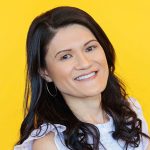 I was born and raised in Los Angeles, but headed to the East Coast for college. I completed my undergraduate studies in biochemistry and biophysics at Yale University. It was in college that I first became interested in medicine, after spending some time at a local clinic and several summers abroad in developing countries working on innovative health care delivery programs. During medical school, I was drawn to the field of ophthalmology because of the mix of medicine and surgery, the wide variety of interesting pathology and the gratification of preserving and restoring vision. I completed my ophthalmology residency at the Massachusetts Eye and Ear Infirmary/Harvard Medical School, and obtained additional fellowship training in ophthalmic genetics at the National Eye Institute, National Institutes of Health.
I was born and raised in Los Angeles, but headed to the East Coast for college. I completed my undergraduate studies in biochemistry and biophysics at Yale University. It was in college that I first became interested in medicine, after spending some time at a local clinic and several summers abroad in developing countries working on innovative health care delivery programs. During medical school, I was drawn to the field of ophthalmology because of the mix of medicine and surgery, the wide variety of interesting pathology and the gratification of preserving and restoring vision. I completed my ophthalmology residency at the Massachusetts Eye and Ear Infirmary/Harvard Medical School, and obtained additional fellowship training in ophthalmic genetics at the National Eye Institute, National Institutes of Health.
——————————————————
To listen to the EXTRA portion of this show go to RealEstateInvestingForWomenExtra.com
Learn how to create a consistent income stream by only working 5 hours a month the Blissful Investor Way.
Grab my FREE guide at http://www.BlissfulInvestor.com
Moneeka Sawyer is often described as one of the most blissful people you will ever meet. She has been investing in Real Estate for over 20 years, so has been through all the different cycles of the market. Still, she has turned $10,000 into over $5,000,000, working only 5-10 hours per MONTH with very little stress.
While building her multi-million dollar business, she has traveled to over 55 countries, dances every single day, supports causes that are important to her, and spends lots of time with her husband of over 20 years.
She is the international best-selling author of the multiple award-winning books “Choose Bliss: The Power and Practice of Joy and Contentment” and “Real Estate Investing for Women: Expert Conversations to Increase Wealth and Happiness the Blissful Way.”
Moneeka has been featured on stages including Carnegie Hall and Nasdaq, radio, podcasts such as Achieve Your Goals with Hal Elrod, and TV stations including ABC, CBS, FOX, and the CW, impacting over 150 million people.
Creating Passive Cash Flow With Non-Performing Notes With Paige Panzarello – Real Estate Women
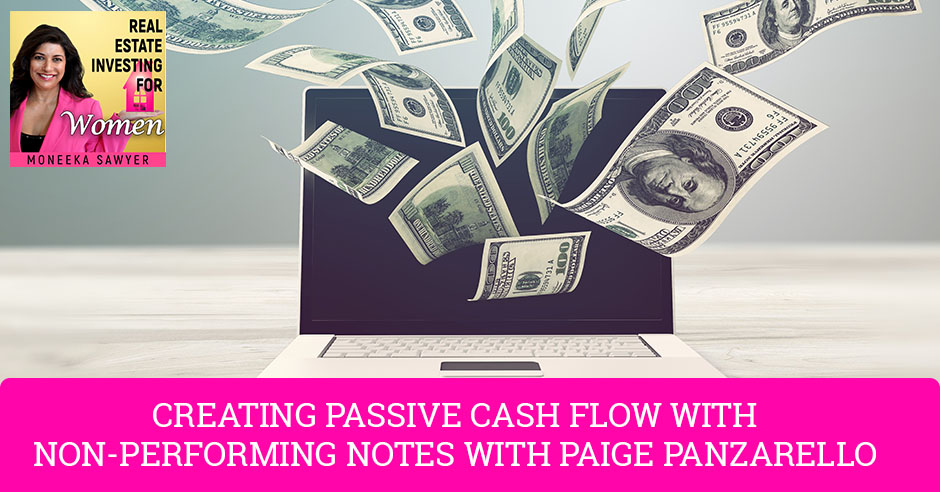
Can you imagine what it’s like $20 million dollars just when you’re starting to perform well in real estate? Paige Panzarello went through this ordeal in 2007, and it almost ended her real estate career. But now she’s bouncing back and she’s doing well with passive cash flow. And she’s doing it with non-performing notes! Listen to this episode as Paige tells it all to Moneeka Sawyer.
—
Watch the episode here
Listen to the podcast here
Creating Passive Cash Flow With Non-Performing Notes With Paige Panzarello – Real Estate Women
Real Estate Investing For Women
I am so excited to welcome to our show, Paige Panzarello. Having been a real estate investor and entrepreneur for many years, Paige has experienced many facets of real estate investing. Her experience includes founding and running her own residential and commercial construction and acquisition company.
She does buy and hold residential and commercial real estate investing, tax deeds and liens investing, and fix and flip residential remodeling and other forms, to name a few. She focuses on non-performing notes that she purchases all across the United States. Whether in residential or commercial real estate in California, Arizona or nationwide, Paige has been successful in completing over $150 million in real estate transactions to date. Welcome to the show, Paige. How are you?
Thank you so much for having me on. I’m so excited to be here.
Let’s start with your story. Tell us where you have been.
I have been a real estate investor for many years. I started my real estate investing career a little differently than most people. I literally was thrown into the deep end of the pool by virtue of inheritance. I knew nothing about real estate investing or real estate, much less investing. My grandmother passed away.
She had a rather sizable estate, half of which was in California and half of which was in Arizona. Off I went at a very young age to Arizona, knowing nothing about real estate or real estate investing. We had 38 townhome units that were only about 40% occupied. We had a sewer treatment plant and some land. I knew nothing about anything. Unfortunately, the estate was about $4 million in debt.
I was thrown into the deep end of the pool and learned quickly that all I had to do was ask questions and surround myself with people that had the answers. I was good at that and doing what I said I was going to do. If I said I was going to do something and asked the people that we owed money, I asked them to work with me, and they did. The flip side is that I was able to do what I said I was going to do. I quickly built a reputation, a good one, which was paramount.
I was able in three years to turn the properties around. We brought it back into the black in about three years. We were in a boutique market in Arizona, and I realized that we weren’t going to be able to sustain profitability. I went to my family and said, “I want to build on the land, sell the units and the sewer treatment plant.” They were all for selling the sewer treatment plant, by the way. I wanted to leverage that and go into building the land.
My family said, “I don’t want any part of that.” I said, “I want to buy the company, which I did.” I started to develop the land and hired a contractor. I realized very quickly that he was going to bankrupt me before I was even coming out of the ground. I fired him and found somebody else that would be my qualifying party. I started a construction company knowing nothing about construction. I set the pace to put us on the fast track. We were rocking and rolling. In three years’ time, we had 36 employees. We held all our licenses except HVAC and roofing.
The reason that we didn’t have those is that the insurance was way too high. We were building our own projects, everybody else’s projects, and it was great. Except that, even at that young age, I was exhausted and working myself 18 hours a day, 7 days a week, into an early grave. I was making money hand over fist. I had a lot of assets and liquidity. I thought I was having a good time, and 2007 happened.
Even if you know nothing about real estate, you can still pursue a business within the industry. Share on XThe funny thing is I saw it coming but I was naive in the fact that I thought, “This is not going to happen to me because I’m only leveraged about 10%.” I was wrong. It happened right on top of my head. Everybody that owed me money, their funding froze up. I was in the unique position that I did not have to go through bankruptcy to discharge the debts that I owed. I sold off everything that I owned. I had liquidity and cash. It took me about three years but I paid everybody off. I had a fire sale, everything. At the end of the day, I lost $20 million.
I walked away with my head held high, which was important to me. I still have investors that I work with now because of that. I wanted to make everybody else hold. That was important to me. I walked away from real estate investing for a little while, but I came back like everybody else. I had to rebuild. I didn’t have the money to put it together but I did have a good brain for real estate. I love it. I have a passion for it and a passion for helping people. I went the same route that everybody goes, wholesaling, fixing, and flipping. Some buy and hold as you grow, tax liens, and tax deeds.
I was also looking into and studying non-performing notes. About a year after I started studying it, I bought my first one. Angels sang for me. When you lose $20 million, that has a tendency to shape you as an investor. I know all of my risk tolerance. I know exactly where I’m going. When I landed in the note space, I was ecstatic because it has everything I possibly want as an investor. I never looked back.
Tell me a little bit about notes.
Notes basically are your promise to pay. There’s a variety of different kinds of notes that you can buy. I focus on the first position, meaning I’m the first one to get paid. First position non-performing notes that are secured by residential real estate. You can buy notes that are against cars. You can buy notes that are credit card debt. All those things are promises to pay.
When you finance anything, that’s your promise to pay. That’s a note. I focus on the non-performing space as opposed to the performing space. The performing space is the borrower paying their monthly payment. The non-performing space is where the borrower has stopped paying their monthly payments. My notes again are secured by residential real estate.
Why would you do non-performing?
I get that a lot, “Why on Earth would you buy a non-performing note when someone stopped paying?” The answer is there’s a variety of different reasons but the biggest one is that we would get a big discount. When you buy something at a steep discount, you build in a cushion of equity. That gives you power and control where you can mitigate your risk. After 2007, I was all about power, control, and mitigating risk.

Passive Cash Flow: Ask questions and surround yourself with people who have the answers.
As an investor, can you make money with non-performing notes? How does that work?
When we buy a non-performing note, there is a face value of the note. The Unpaid Principal Balance is also called the UPB. Let’s say that’s $100,000, but the market value of the property is only $80,000. That note is underwater. Those borrowers are underwater. When I buy a note, I buy it based on the current market value of the securing collateral, also known as the house. It’s $80,000, and I will buy it at a deep discount from there. It used to be we were able to buy notes anywhere between 40% and 50%, sometimes even a little less. Now it’s hovering around 55% to 60%, still quite a nice size equity cushion.
For that same $80,000 house, I’m spending $45,000 for the note. They will buy and build in a huge equity cushion. The borrower still owes me $100,000 because the unpaid principal balance is $100,000. I have a lot of flexibility and maneuverability to work with that borrower to either get them to reperform and start paying on their mortgage or sometimes our borrowers will give us what’s called a deed in lieu of foreclosure. They don’t want the house anymore but don’t want the foreclosure on their record.
They will deed us the property as payment in full. I can turn around and sell that house for $80,000 because that’s the market value of the property. That’s how I make money as a note investor in buying non-performing notes. The best part, though, is if we get it to reperform, not only am I generating chunks of cash. I’m also generating streams of monthly cashflow. I’m creating two different avenues of money coming into my pocket in the same vehicle, which is tremendous as far as I’m concerned.
Tell me a little bit more about that. How does that work?
In terms of the reperformance or the exit strategies because we have 23 different exit strategies in note investing. Remember, I’m risk-averse. With 23 different exit strategies that are avail, we are able to mitigate that risk. Were you asking about the reperforming situation and how we generate chunks and streams of cash?
Yes.
Getting a borrower to reperform is my favorite exit strategy that we use. It happens about a third of the time. We generally only use four main exit strategies but we still have 23 at our avail. Everybody knows about foreclosure. That’s one of our exit strategies. Sometimes, we have two. Short sale, everybody knows what a short sale is. It’s $100,000, and the borrower comes to us and says, “I have somebody that’s willing to buy it for $80,000. Will you accept it?” How fast do you think I’m going to say yes?
When you say something you need to do, just do it. Share on XDeed in lieu of foreclosure, I’ve already explained. The reperforming situation is my favorite. The borrower comes to us through our loss mitigation team. This is something I understand that I have a team in place. I have direct contact with our borrowers because I’ve got a very big heart, and everybody has got a story. I am not a licensed debt collector. The team that I pay is licensed, debt collectors.
They know all the CFPB rules and regulations. It’s well worth the small fee that I pay them per asset, per month, to deal directly with our borrowers. They are the liaison. Through our team, we talk with our borrowers and let us know that they want to stay. Let’s say that the same unpaid principal balance is $100,000, the house is only worth $80,000, and they haven’t paid for 2 or 3 years.
We get a lot of these that haven’t paid 2, 3, 4, even sometimes longer. They now owe us another $20,000 between arrearage, and maybe we have fronted some property taxes, so we don’t lose our collateral that’s securing our invested dollars. Let’s say the total amount due, the total legal balance is $120,000 but the house is only worth $80,000. There’s $40,000 on the hole.
They say they want to stay, had a medical condition, whatever, but now, they can pay. We are in a position where we can go to that borrower, and eventually, we do this through what’s called a forbearance agreement. We don’t do a permanent loan modification immediately. The borrower hasn’t paid for a while. They have to have a little skin in the game.
We will say to them, “We are going to require a reinstatement fee.” It’s usually somewhere around $2,500 to $5,000, depending. Believe me, when people want to stay in their homes, they figure out a way to come up with that money. There’s that chunk of cash. We will say to them, “We will put on hold the $40,000 that is underwater.”
We will do the forbearance agreement and a trial payment plan. You pay your reinstatement fee. We can do so many different things. We can lower interest rates and payments. We can create a new amortization schedule. We can stretch out their payments and make their payments lower. We can forgive some of the principal balance.
We will work out a payment plan that works for that borrower that works for us in terms of our numbers as well. If they pay for the first 4 to 6 months on time, every time, we will take half of that $40,000 and forgive it. If they pay on time, every time for the next 4 to 6 months, we will forgive the other half. At that point, we will put a permanent modification in place at $80,000, which is the market value of the property.
It is a more manageable mortgage for our borrower, at $80,000. We’ve created a chunk of cash at the beginning of this whole process. We’ve monthly cashflowed every single month. There are your streams of cash. At the end of the twelve months, we have a decision to make because we now have what’s called a season’s note.

Passive Cash Flow: When you buy something at a steep discount, you build in a cushion of equity and that gives you power and control where you can mitigate your risk.
There are plenty of note investors that are out there that like the performing notes because they like the monthly cashflow but they don’t want to be a landlord. They don’t want the tenants and toilets. They are willing to buy that performing seasoned note from us. We slightly discount it to another note investor. They are willing to buy that close to close to par, which is close to the $80,000. We will discount it a little bit and give them an equity cushion. You can see how that’s very profitable or we can hold onto it and keep cashflowing it. We do choose to do that as well.
That’s one of your exit strategies. I can totally see that you have a big heart. You want people to be able to keep their homes, and I feel the same way. It’s beautiful.
Especially after the 2007 crash, I have had life happen to me, and sometimes I have to take off my heart hat and put on my hard hat, and that’s never fun to do. My goal is to set out to help people. I’m in a position, by becoming the bank as a note investor, to do that for those that qualify, and not everybody qualifies but that’s a big thing for me.
You told us a little bit about your exit strategy, why don’t you walk us through the steps of acquiring a non-performing note?
Acquiring a non-performing note is very similar to any other type of real estate investing. There are two things that everybody looks for in real estate investing. One is deals, and the other is money. Note investing is no different. It’s about your network and networking. I like to think of investing as a more gentle form of real estate investing.
There is competition but it’s not nearly as fierce as the fix and flip market. You need to network. As everybody knows, your net worth is determined by your network. You need to get out there, start asking questions, start talking to people, go to REIA meetings, join BiggerPockets, and listen to podcasts. All those things are important to get you into the note space.
The interesting thing about the note space is at the asset managers. I used that word as an all-encompassing word. These are the people that handle portfolios for a variety of different sources, banks, hedge funds, other note investors, smaller commercial banks, community banks, credit unions, etc. The asset manager is the one that handles the portfolio and the disposition of the assets. Asset managers in the note space it’s very collaborative.
As you develop your relationship and your reputation with these asset managers, they will introduce you to other asset managers, which blew me away the first time that that happened to me. I thought, “Why on Earth would he do that?” You would think that there would be a lot more competition but there isn’t. That’s great too. If you do what you say you are going to do in the note space, and by the way, that is paramount, please do not waste these asset managers’ time. They do not like it, and you won’t get any more products. As long as you develop that relationship, they will help to catapult you to the next level.
You have to put action behind the desire. That's how you start. Share on XThat’s true with everybody, do what you say you are going to do. It’s also interesting how we don’t do what we say we are going to do for ourselves. There’s one thing about doing what you say you are going to do for other people but what about for yourself too? Part of building a blissful wealth empire is keeping your commitments to yourself, making yourself a priority and your promises a priority to yourself and others.
That’s such a hard thing for entrepreneurs because, as entrepreneurs, we put everybody else in front of us all the time, and it’s almost like we feel guilty if we take a spa day.
There are other ways. Yes, in the take care of yourself. That’s very important. The other thing is I’m committed to learning about real estate, and these are the steps that I’m going to take. Instead of putting off those steps, it’s to keep those promises. “Now I’m going to research notes or I’m going to send to this person to further that business.” Much of the timepieces of this can be intimidating.
It can be scary. They can feel overwhelming. Instead of keeping our promises, we procrastinate. That slowly chips away at our self-confidence. On all levels, whether it’s for your business, yourself or your family, keep your promises to yourself and the people around you. Tell me, what is the most rewarding part of investing in notes?
I get to create win-win situations for everybody. If I can help a borrower reperform and stay in their home, that is the most rewarding. We have had situations where we have had families and single moms that have a couple of kids that are going through a divorce. The big banks didn’t care. We came in and were able to help keep that family, that single mom, and her kids and their home. That is fulfilling and rewarding to me, more so than any amount of money. Having gone through and had life happen to me is the most rewarding part for me all day long.
Haven’t you loved hearing Paige talk about her notes investing strategy? Do you want to learn more from her? You can learn how to create real wealth with real estate-backed non-performing notes from June 10th to 12th. In Paige’s three-day, hands-on, interactive, virtual, and packed with information event, you will learn how to get started investing in notes so you can grow your nest egg, achieve your goals faster, retire early with peace of mind, create chunks of cash and streams of monthly cashflow. The options are endless, and you will be helping people stay in their homes.
Ladies in the green room before the show, Paige mentioned that this is the only event she’s offering this year. Don’t miss it. Otherwise, you will have to wait a long time to get this opportunity again. Take action now, so you can take advantage of this market. The opportunities in notes are staggering. See what all the buzz is about and reserve your seat now at BlissfulInvestor.com/notes. The virtual live event is from June 10th to 12th. Are you ready for three rapid-fire questions?
I am.

Passive Cash Flow: Just as long as you stand in integrity and you behave that way, people will be understanding because life does happen. Mistakes are made but don’t lie to people and don’t try and pull the wool over their eyes, just stand in your integrity, own up to it.
Tell us one super tip on getting started in real estate investing?
Take action. You can educate yourself to the cows come home but if you have analysis paralysis, you are never going to go anywhere. You got to put action behind the desire. That’s how you start.
What is one strategy for being successful in real estate investing?
This is a big one. To be successful, you have got to make the deal conform to you and who you are as an investor, not the other way around, do not ever conform to a deal. You set the guidelines, the outline, the bullet points, and what is your good risk tolerance and make the deal conform to you, do not conform to the deal.
What is one daily practice that you do that you would say contributes to your personal success?
I have integrity. We are all human. We all make mistakes. I don’t ever try and pull the wool over somebody’s eyes. If I make a mistake, I own up to it. People know when you are dealing with people and teams, money and emotions, there’s a big swirling around of all of that. As long as you stand in integrity and you behave that way, people will be understanding because life does happen. Mistakes are made, but don’t lie to people and don’t try and pull the wool over their eyes. Stand in your integrity, and own up to it. Believe me, and you will have more forgiveness and a better, stronger relationship if you behave that way. That’s how I conduct not only my business but my life.
Thank you so much for all of your words of wisdom for my audience. This show has been amazing.
Thank you for having me. I enjoyed it.
Don’t miss Paige’s upcoming three-day virtual live event from June 10th to 12th. It will be a long time before she’s going to be doing this again. Don’t miss it. Sign up now at BlissfulInvestor.com/notes. Thank you so much for joining Paige and me for this show. I look forward to seeing you next time. Until then, remember, goals without action are just streams. Get out there, take action and create the life your heart most deeply desires.
Important Links
About Paige Panzarello
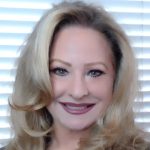 Paige Panzarello is the “Cashflow Chick”. Having been a Real Estate investor and entrepreneur for almost 25 years, Paige has experienced many facets of real estate investing. Her experience includes founding and running her own Residential and Commercial Construction and Acquisition companies, Buy and Hold residential and commercial real estate investing, Tax Deeds/Liens Investing, Fix and Flip (Residential Remodeling), and other forms to name a few. She currently focuses on Non-Performing Notes that she purchases all across the United States. Whether in notes, residential or commercial real estate, in California, Arizona, or nationwide, Paige has been successful in completing over $150 million in real estate transactions to date.
Paige Panzarello is the “Cashflow Chick”. Having been a Real Estate investor and entrepreneur for almost 25 years, Paige has experienced many facets of real estate investing. Her experience includes founding and running her own Residential and Commercial Construction and Acquisition companies, Buy and Hold residential and commercial real estate investing, Tax Deeds/Liens Investing, Fix and Flip (Residential Remodeling), and other forms to name a few. She currently focuses on Non-Performing Notes that she purchases all across the United States. Whether in notes, residential or commercial real estate, in California, Arizona, or nationwide, Paige has been successful in completing over $150 million in real estate transactions to date.
She has been a regularly featured guest on “The Cashflow Guys” podcast, and you can also find her on the “Best Ever Show” with Joe Fairless, “The Note Closers Show”, “Cashflow Ninja”, “Secrets to Real Estate Investing” and “Real Estate Investor Goddesses” podcasts, among many others. Paige has also been interviewed and highlighted in an article in the Wall Street Journal. She also speaks at various different Real Estate Investing clubs and conferences across the country.
Paige has been purchasing Non-Performing Notes (NPNs) since 2014, and she formed The Tryllion Group, which invests in Notes across the country.
Paige teaches the “Building Wealth with Notes” Workshop that drills down into the details of how to buy Non-Performing Notes, what to look for, due diligence to perform, and most importantly, how to mitigate risk. Her 10-week Master Class is a hands-on deep dive where Paige walks you through the nitty-gritty details to be a successful Note buyer.
Having experienced the hardship of the economic downturn of 2007, and what she calls “a very difficult learning experience”, Paige knows first-hand how “life can happen” to everyone. Her company was founded to help people in distress. Paige is also driven to help educate people on the importance of passive income, deal evaluation, money and debt management. She wants everyone to elevate their situation and become free of dependence on anyone or anything, so that when “life happens”, people will be ready, not broken.
Whether it is improving communities one house at a time, helping borrowers stay in their homes, or working with other investors to learn a new way to potentially earn higher returns for their investment dollars toward money cash flow or their retirement years, Paige is dedicated to helping people improve their lives in every way. She lives by the motto, “People first, profit second.”
______________________________________
To listen to the EXTRA portion of this show go to RealEstateInvestingForWomenExtra.com
To see this program in video:
Search on Roku for Real Estate Investing 4 Women or go to this link: https://blissfulinvestor.com/biroku
On YouTube go to Real Estate Investing for Women
Moneeka Sawyer is often described as one of the most blissful people you will ever meet. She has been investing in Real Estate for over 20 years, so has been through all the different cycles of the market. Still, she has turned $10,000 into over $5,000,000, working only 5-10 hours per MONTH with very little stress.
While building her multi-million dollar business, she has traveled to over 55 countries, dances every single day, supports causes that are important to her, and spends lots of time with her husband of over 20 years.
She is the international best-selling author of the multiple award-winning books “Choose Bliss: The Power and Practice of Joy and Contentment” and “Real Estate Investing for Women: Expert Conversations to Increase Wealth and Happiness the Blissful Way.”
Moneeka has been featured on stages including Carnegie Hall and Nasdaq, radio, podcasts such as Achieve Your Goals with Hal Elrod, and TV stations including ABC, CBS, FOX, and the CW, impacting over 150 million people.
The Magic Of Asking With Mark Victor Hansen – Real Estate For Women
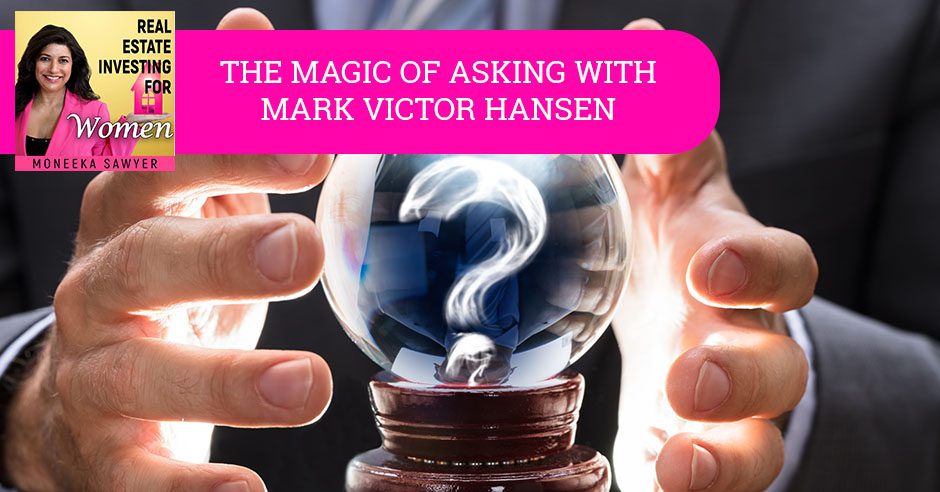
When we were young, we always asked questions regarding things around us out of curiosity. The answers to those questions provide us with the knowledge we need to face the unknown. In this episode, Mark Victor Hansen talks about the magic of asking and some of the roadblocks people usually have that prevent them from doing so. Mark is best known as the co-author for the Chicken Soup for the Soul book series and brand, setting world records and book sales with over 500 million books sold. Tune in and rediscover the magic of asking. Plus, learn Mark’s technique for asking your higher self, the universe, or God how to find out what your destiny is and what you’re supposed to be doing.
—
Watch the episode here
Listen to the podcast here
The Magic Of Asking With Mark Victor Hansen – Real Estate For Women
Real Estate Investing for Women
I am so excited to welcome to the show Mark Victor Hansen. Mark is best known as the Coauthor for the Chicken Soup For The Soul book series and brand, setting world records and book sales with over 500 million books sold. Mark also worked his way into the worldwide spotlight as a sought-after keynote speaker and entrepreneurial marketing maven, creating a stream of successful people who have created massive success for themselves through Mark’s unique teachings and wisdom.
With his endearing charismatic style, Mark captures his audience’s attention as well as their hearts. Having spoken to over 6,000 audiences worldwide with his one-of-a-kind technique and masterful authority of his work, time and again, he continues to receive high accolades from his audiences as one of the most dynamic and compelling speakers and leaders of our time. Mark and Crystal Hansen have coauthored their newest book that was released called Ask! The Bridge From Your Dreams To Your Destiny.
—
Mark, Happy New Year. Welcome to the show.

The Magic of Asking: What’s so extraordinary is that most people never ask themselves what they want.
It’s super exciting because it’s a new year and a new you or a new renewed you because everybody is into the transformation of consciousness, awareness, thinking, and ready to burst with joy and enthusiasm and euphoria. How’s that?
Do you know what I love about the New Year? I don’t set New Year’s resolutions. I set New Year’s intentions. I figure my New Year is on my birthday, which is May. I feel like I get two New Year’s every year and they’re about six months apart. What I love about this winter New Year is that we are planting the seeds that are going to burst in the spring in a couple of months and there’s so much anticipation. There is so much possibility at this moment. Wouldn’t you agree?
I 100% agree. It could not be more exciting. What you’re going to do is you got to ask yourself. Ask! The Bridge From Your Dreams To Your Destiny is our best-selling book, but what is your destiny? That’s the question of the new you, the new year, because as good as you are, you could be better. As big as you are, you can be bigger.
You got to know what it is you want to be, want to do, and want to have. All of that is done by one miraculous three-letter word that no one ever wrote a book to, and you get the trademark of the title ASK. How could it be easier because all I got to do is ask yourself, ask others and ask God what you want to talk about? I’m thankful that we’re going to ask, what are you going to do to make this the best year, best decade, and best life that you’ve ever had, and you’ve got to figure it out and put it in writing. I’m going to talk to you about how simple that is.
I want to say that there are many people that binge this show, so you might be reading this in September or any time of the year to understand. I know how trite this is going to sound, but I have to say it. This is the first day of the rest of your life. This conversation is relevant no matter what time of year or when you’re reading it, so keep that in mind. One of the things that I wanted Mark on the show for ladies is, as we start to build our dream and meet our destiny, as Mark is going to talk about, we start to ask ourselves, what is it that we want? We have talked a lot about that in this show.
We set our goals and we ask the universe for support. Mark, you can correct me if this is for everybody, but I’m sure that it is, especially for women. We have trouble asking the people in our network, the people who love us, around us, and the people we don’t know yet. I know that Mark and I are aligned on this. We’re going to talk about all of those three different ways to ask. The very first thing I want to ask you, Mark, is why did you write this book? You gave us a little bit, but dive in deep on why you and Crystal did this.
My beloved wife and I wrote Ask! The Bridge From Your Dream To Your Destiny is very simple. We have traveled and been more blessed than anybody did in 80 countries around the world. We talked to 7 million people live and what’s so extraordinary is most people never ask themselves what they want. I have medical doctors. We have people pair bond and do what you said. They say, “Your class was more important than all my medical school training or engineering training, or whatever.” We asked them 50 times like, “What do you want?” What happens is you get past the super system, “I want a wardrobe that’s good enough to own a men’s store or women’s store. I want to be a fashionista. I want to have this car, that car, electric car, or a Rolls Royce,” or whatever it is that you want.
By the time you hit 50 times asking, you suddenly go, “What is my personal life? What am I going to dedicate myself to humanity for?” The big question we asked, the last question in a book from our friend, Dr. Peter Diamandis is, “What are you going to do during this decade to positively affect one billion people?” You’ve got ten years. You’re going to affect one billion people.
As good as you are, you could be better. As big as you already are, you can be bigger.
What it does is it blows the lid off because what is asking does and what we learned gives illumination, insight, answers, and solutions. It gives new protocols, so your life becomes what it’s supposed to be because all of us are here with a destiny. That’s what this critical little word here destiny. Most people never ask themselves what their destiny is. Your mother said, “You’re going to be a doctor, a lawyer, an engineer or a businessperson, dentist, or a garbage person.”
All of which is noble, but that’s not the issue. The issue is all of us is a polymath. It’s not for Ben Franklin to be a writer, a statesman, an inventor of bifocals, hama-hama, and fly the first kite to find electricity. All of us are intrinsically polymaths, meaning many opportunities. In other words, “Yes, I’m the world’s best-selling author of 500,000 books. I’ve talked to more people live. I’ve created more millionaires,” but I’ve also own one of the fastest-growing alternative device energy companies that pop up windows called Natural Power Concepts and other companies. They are extraordinarily doing wonderful stuff because the question isn’t how little you can do and get away with. The questions are, how do you become financially free independent, so you can express who you are by having your self-awareness, self-expression, and realization of yourself.
You’re speaking my language. We are a real estate show and I love how you brought that financial piece in there because many people think that it’s noble not to focus on money. I love the word that you used noble and I love that we talked about the ability to expand. It does have a lot to do with our financial bearing. Can we take care of ourselves and do we have the money to give to the causes, whether it’s causes or the companies that we want to build that can then reach and benefit the planet in many ways. Many people think money is a bad thing. It’s not a bad thing. It’s simply a tool. As we ask, sometimes we feel a little bit like, “Should I be asking for this? It’s a financial base thing. It’s a goal to help me to grow in this particular way. Maybe people will judge me.”
The first thing is to understand within yourself that your financial security is a huge part of the amazing things you can do in the world. You want to reach a billion people and maybe some of you want to expand your family. Pay for college for your kids. That’s your big deal or your big expansion. You still can’t do any of that unless you’re taken care of and have the financial access to support all those things. Wouldn’t you say?

The Magic of Asking: Asking gives illumination, insight, answers, or solutions. It gives new protocols, so your life can become what it’s supposed to be.
First of all, you and I are talking the same language. Let me say that first of all, from a spiritual point of view, ask yourself, ask God. God created the universe and we now know that there are 40,000 other planets in our sources. We’ve discovered that in the last few years in the Hubble that are like ours. We’re probably not the only intelligence in the universe, but we’re the highest intelligence on this planet.
Therefore, if you’re of high intelligence, one of the things you’ve got to do is earn more, save more, invest more than you could ever do. I was bankrupt in 1974, which I now think is my best work experience. I lost $2 million in one day. I went bankrupt after living in New York. I had to go to the world’s biggest library, the New York Library, and check out a book on how to go bankrupt by yourself because if you ask the wrong question, you go the wrong way.
I said, “How do I go bankrupt?” It got me out of what I shouldn’t be doing into the speaking. Once I was speaking, I said, “You’re supposed to earn it, save it, and invest it. Don’t buy two cars but buy one home. If you buy one car and two homes, the second home is an investment income home.” Let’s do my own story because it was a real estate company. I’m back in Long Island, New York. I have a mastermind group, which everyone has got to have. Two people come together and it’s the power of eleven. We had this little family, who’s still my best friend years later. They are buying and fixing up real estate and they say, “We got a house to sell to you for $2,000.” I remember I had no credit. I went bankrupt and no credit for seven years.
I was like, “Here’s a check for $2,000.” I bought a $14,000 house. This was in East Islip, Long Island, New York. The only mistake is I called Steven in Bel-Air. They are still in real estate and have done exceedingly well around the world. Three years later, I sold it for $58,000. I thought I was again the smartest guy in New York. The mistake we made was one, we should have bought all of East Islip and fixed it up, but at that time, I had not written a book that I’ve now written that I’ve finished called How to Think Bigger Than You Ever Thought You Could Think. Little thinking doesn’t pay off. Big thinking pays off.
The second thing I did was a book called Stand Up, Speak Out, and Win. I sold 20,000 copies from platform and I made $200,000. It’s $10 a book. I was selling in little itty bitty audiences. It’s not available anymore, but that’s it. The little audience is 6 people, 12 people, and 50 people. I said, “This isn’t a New York Times Bestseller or National Bestseller, but it is my bestseller, and I want to sign it for you, your spouse, your kids, and even dogs outside of your car,” and they all laughed. The first time I told them that is 37 people were standing in line and I made $370. I thought, “This is a good business.”
The second mistake I made is like the first. We should have bought all of East Islip. I’m holding up a mirror, so you look at my story and find your story of all the parables. The first thing is look for the parable. It’s the story within a story. There’s a literal story. The literal story is Mark went bankrupt and decided to become rich. The figurative story is you should have bought more of East Islip.
I write 5 to 7 books at a time, and I’ve got 318 books. Most of them are bestsellers. I have done more New York Times Bestsellers than anyone alive before the Guinness Book of Records. I’ve sold more books that are titled and more number ones. We’re number one in a lot of countries. The point I’m making is I could have started that earlier if I had thought differently. I’m holding up on a mirror. It’s the New Year, a new you or a renewed you if you’re watching in May or September, December, a year, two years, or five years.
How big can you think? You go inside your deeper innermost and what we’re saying is ask. Ask yourself, ask others, ask God. “God, what’s your destiny for me and how big is it? How miraculous is it? How empowered is it? How much favor? Can I be younger to buy however many points of income-producing real estate in new, innovative, exciting ways that may or may not include bank financing?”
I didn’t have any bank financing. Steve financed it out of the $14,000 I gave. In 2008, I financed the other $12,000. I bought the house for $7,000. It was a shack. We had to put in new heating and new walls and everything, but it still works. The only thing is that you’ve got to make sure that you’re doing enough and maybe I’ve overstated that or gone too long. Did that wrap for you?
Big thinking pays off.
Absolutely. First of all, I love when people speak inspired, so thank you for that.
I got to do one more subpoint. Do I believe you’ve got to read books? Yes, you ought to read at least 1 to 3 hours a day, self-hope action books. I do write fiction books and I love them. The fact of the matter is you need to have the basis. The foundation is got to be deep, so you know simple stuff. You check the Law of 72 because the first question is when I have 387 employees and demand a $100 million company in Newport Beach. The first question I ask all these MBAs that came in immediately is, “What’s the Law of 72?” If they didn’t know it, next. How could you go through your school and not know the Law of 72? These are some basic laws I teach.
Mark, I love that you said there are a million ways to make $1 million. I say that at least once a month on this show. There are a million ways to make $1 million in real estate. You have to find the one that’s perfect for you.
There’s a niche for everybody. We had a meeting with a guy who owns 10,000 units in town and he did it in his way, but everyone can do it in their own way. There’s a lot of ways to do it and there’s a lot in the world that needs it. When I was back in graduate school, the smartest guy, as far as I know, was my teacher, Dr. Buckminster Fuller. His teacher was Albert Einstein, but Bucky had us write down our goals. Now remember, I’m a 21-year-old and a 71-year-old is telling us to make the world work. One of my ten macro goals let’s be totally considerate environmentally in every other way. Let’s get it done.
We’re 1 billion people out of 8 billion people alive who don’t have a house, so let’s get that program going. Everybody reading or somebody out there is going to go, “I heard what Mark said. I can go figure out how to do it in Africa, India, China, Latin America or in America.” We were helping out people in the Indian tribes right here at the four corners area of Arizona. A lot of them don’t have houses and you go, “This is 2022. What are you telling me?” Not only do they not have houses, but they also don’t have electricity. They got the wind farms up there. I’m Danish and we said, “Something doesn’t smell right in Denmark.”
That’s such important work. It’s another one of those things where you’re doing something that’s beneficial for you. You’re also doing something that’s beneficial for a community or for people. There are so many ways to do good in the world, and we still expand for it in many different ways.
I wrote a whole book called The Miracle of Tithing, in which businessmen say, “What is a miracle kissing?” I said, “You haven’t been kissed enough lately.” I said, “You’re going to tithe your thinking.” That’s the most important and very few people do it, then you tithe your time. We tithe every book I’ve ever done. That’s why I sell more books than anybody, then you tithe your treasure, your money and you’re thankful in advance that you’re going to tithe it up. It’s bonus points. The point is, I’ll open up the windows of heaven and I’ll open up my sky vault and before you know it, you’ve got such a ritual, or you won’t be able to receive it. That’s why so many people watch my YouTube videos in Africa. They go, “I didn’t know that.”
I didn’t know it either. When I was coming through, I went bankrupt because I wasn’t thinking well. I teach people to think right, talk right, act right, and live right to go get the roads up because you and I are here to have an impact. When the game is over, you look back over your life, “I wasted it.” If I’m being honest, I said, “I could have bought East Islip for nothing.” All those houses went from $14,000 to now $500,000 houses.
I released my TEDx Talk. It’s called, Who is the Boss of You? It’s about living a life of choice. The biggest thing about living a life of choice is what we get to do with that choice. If we make choices that include other people, whether it’s contribution, travel, being active in your community, whatever it is. That contribution and connection with other people is a thing that brings us to happiness. If anybody wants to watch the TEDx, it’s at BlissfulInvestor.com/TEDx.
I love what you’re talking about with this whole piece of what we can do or what contribution tithing means. I do talk about it. If you don’t have money, there are many other ways to tithe through your thoughts, your actions, holding a door for somebody, helping somebody to their car if they can’t walk, or working in a soup kitchen. There are all different kinds of things and there are many different levels of tithing that starts up in your mind.
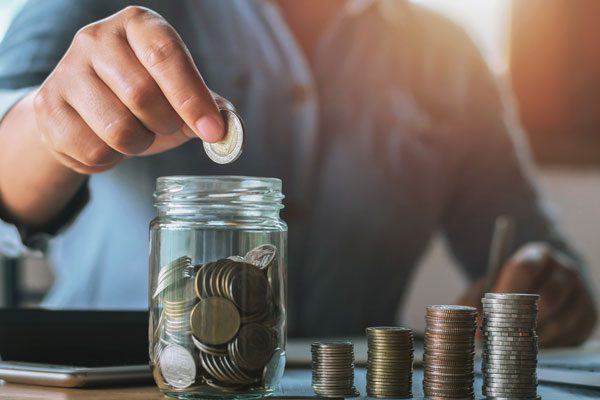
The Magic of Asking: One of the things you’ve got to do is earn more, save more, and invest more than you could ever do.
When you wake up in the morning, you’d say, “You’re either a giver or a taker.” If you’re a taker and think you can take it all, here’s the question I ask. “Hold on to it. Don’t ever let it go. If you can’t do it, you got to give a breath before you can take the next breath.” One time, Bob Allen and I were at Maui Writers Conference. We’re on the beach and the beautiful Pacific. It’s 6:00 and we’re talking at 9:00. Bob says, “Come on, Mark. You wrote the book on tithing. Explain to me how it works.” He’s a Mormon and a good one and a Bishop and all that good stuff. I am not a Mormon, but I should respect every religion. The point is, we’re walking and he said, “You got a metaphor for tithing,” and it came to me spontaneously.
I said, “We’re looking at the water. Water has three forms. Tithing has three forms. When it’s frozen is when you don’t give. You’re constipated, stifled, stopped, or shuffled. When you get a little ambient, then you have a little bit of flow. You give a little bit. You go to church and get 1% or you help out somebody once. You do a little, then you get a little. Once you heat it up, then you become like vapor.” Everybody has been in a closed bathroom when you took your shower and one drop of water will steam up a whole mirror. You can’t see, and you got to wipe up. That’s what tithing does. It takes that 10% that you give to the noble good charitable causes that are worthy and getting the results you believe in and expands it.
It’s not you and I that’s expanding. I’ve learned three levels of money by writing this book From Wishes to Riches. I learned from one of my close friends in New York. He got me out of poverty when I got bankrupt and upside down. He said, “There is the material form of money, but then you go to the psychic form of money where you think about it. The real goal is to get the spiritual form of money where you can create it almost instantly because think and grow rich is what Napoleon Hill said. He emerged to that. Andrew Carnegie emerged to that.” I’m telling you that Elon Musk, who’s my hero, who’s the richest man in the world, he’ll be one of the two first trillionaires with his partner, Kiyo, as far as I’m concerned.
The point is it’s explosive and extraordinary what somebody can do when they go to the higher levels of what money is because you’ve got to get out of you working for money. One of the ways that money works for you and you pick, how much do I need a month? Do I need $1,000 passive, massive cashflow coming from real estate? If I have a house that rents for $1,500 a month, then I pay HOA and all the stuff for $500, then I get $1,000. If I need $10,000, then I need ten single-families or I need ten units. Pretty simple and you go, “Is it that simple? Come on.” I’ve been in real estate in seven different states at the same time, so I understand you can do that, and it still works, but it doesn’t matter.
There are a few things that matter. You need to know what to ask for, take action and support. I want to talk about why it is hard for people to ask? What do you think is it that stops them?
The second chapter in the book, after we do the fable of McKayla, which everybody can get. We’re going to give it to you free if you want by going to AskTheBookClub.com. We’ll talk about it later. We say there are seven roadblocks to asking. First of, all of them hit us once in a while. Some of us have all seven hits then you get prepped to respond. It’s good that you read our book or listen to it on video or watch it on YouTube. Overcome your lack of self-worth fullness because self-worth will usually be first.
The second is fear, then doubt, then naivité because you don’t know what you don’t know. You don’t know you can buy real estate even if you don’t have any money. I didn’t have any money, but I did have the right friends. It’s like what we’re saying, your net worth comes from your network. One of my many market trends includes shapes. You’ve got pattern paralysis where you do the same thing and keep expecting something new. I cited if you keep doing the same thing and expect new results, then you’re crazy.
I don’t watch shows like yours and listen to people who have done it. Be careful because all of us have friends, neighbors, and relatives. My wife and I start every day with an hour of meditation. The story of Jesus is not a prophet in his own hometown. We were talking about our role. If she is 1 to 9, I’m 1 to 4 and you go, “That’s true.” It’s your own role in the dark spectrum, no matter how rich you get, no matter how wise you are and no matter how the world accolades you.” I’ve won some of the biggest words. Like I’m a ratio of Jury Award Winner who came from rags to riches and been exceedingly prosperous and generous and wants to be more so.
The point is it’s exciting to be alive and fulfill your destiny and your mission by overcoming the seven obstacles that all of us have. If you look at somebody else’s story, you go, “That’s what stifling me, stopped me, detouring me or warning me. I’m now empowered by Mark.” We also say, “Here’s the stop sign and here’s how to eliminate the stop sign.” We give you three ways to eliminate stop signs.
It’s exciting to be alive and fulfill your destiny or mission.
Can you give me a quick synopsis?
No. If I did that, you wouldn’t have to read the book.
It’s okay if you don’t want to give it, but I would love it if you gave us a little bit.
I’m teasing you and I will answer your question in the second. A book is the best screening value ever, whether it cost $20 or $10. I’m going to telling you the crazy thing that’s happened when we became number one. The book is $21 on the cover in America. Now, we’re selling number one on Vietnam and maybe in Australia and all kinds of England. The point is Amazon does the opposite. They brought the price down to $14. It might be the best $14 you ever invest because you’re not investing in me. I’ve already done it. You’re investing in yourself, so you know how to ask yourself because that’s the real trigger here. Our research shows that 75% of people are afraid to ask. You’re born an incredibly inquisitive kid and we’ve got grandkids or something.
We were in Hawaii in our company. It’s a natural park concept. We’re on the beach and all of a sudden, I get a call from our six-year-old. For Christmas, you got to give him a watch. He phone calls his parents and the grandparent’s house. He said, “Grappy, are you alone?” I’m looking around at the beach and I go, “I’m here with Grammy.” He calls her Mimi. I said, “Mimi and I are here.” He said, “Can I talk to you privately?” I said, “Yes.” He said, “Are you still writing great books like the ones I’ve read of yours?” He’s six years old. He’s amazing. He can do the Rubik’s cube in one minute the first time, he got it. God bless him.
He said, “Are you still writing those books?” I said, “Yes, sir.” He said, “Can I write the next book with you?” The first story we’re doing here is about our grandson. That was all of the spreads. You got to buy my book. He’s going to grow up and do wonderful things. The point is, little kids were told, “Gramps has got many questions. Can’t you shut up? You ask why, how, when, and all that,” and then you go to school and I say, “I’m going to tell you what it is about. You go into the military and they tell you. You go to business and they tell you. You go to the life and your spouse tells you. Only two people’s opinions matter, yours and God. That’s it.
You’ve got to ask yourself, “How do I overcome it?” Here’s what you and I are going to do now that everybody is out there to answer your questions. This is M and M. Mooneka and Mark are giving you 100% permission to ask bigger, better, stronger questions with metaphorical biceps and triceps. You can go vigorously, valiantly, courageously, and bravely into a future that is worthy of you. Would you agree with that?
Yes. I’m not going to say anything else. That was so good.
We’re here to empower people to enlarge them. There’s nowhere in any spiritual literature that you’re supposed to be small and unworthy. That’s what roadblocks are. They make you less than because the world was out of its way to work against you. Now, it’s going to sound very self-serving, but I don’t go to sleep without reading positive self-help books.
Sometimes I read my own books and I read other people. In my library, I’ve got 50,000 of other people’s books. I’ve touched more books. I haven’t read every one of them wall to wall, but I’ve read 6,000 biographies and autobiographies. I’m writing biographies for people and writing autobiographies because I’ve had an exciting life. I have climbed Machu Picchu, Whitney, Fuji, and Kilimanjaro. We’re here to do cool, great things.
I’ve hung a week with Richard Branson on the Necker Island and, “I’m a little person.” I have the library 3.0 because the first great library was created by Alexander The Great. He conquered the world, but I got the wisdom, the insight and understanding. Here it is an Alexandria. Where do you live?
San Jose, California.
If you go to New York, you want to go to Andrew Carnegie’s house. It’s 60,000 square feet and it’s 95th and 5th Avenue. It’s owned by the Smithsonian Institute. The first thing he says is, “No man or woman get rich without enriching all others. You were like, “You’re rich and you make me poor.” Hell no, I don’t make you anything. You make you. I don’t touch you. I’ve made more millionaires than anyone other than Napoleon Hill. I go by all the research. The second thing he says is, “Authors are the wealth of the nation.”
The only thing I’ve switched with Andy’s line, the Scotsman, is authors are the wealth of the world. I think everyone is the author of him or herself. If you’re going to author yourself, you better be reading somebody who’s authored themselves well. That’s why I’m saying, “Go ahead and start reading biographies and autobiographies and read all my self-help action books.” Some of the other superstars that you got to read, they will change your thinking and change your life because you’re here to make your life bolder, bigger, better, brighter, more exquisitely exciting, penalizing and we love.
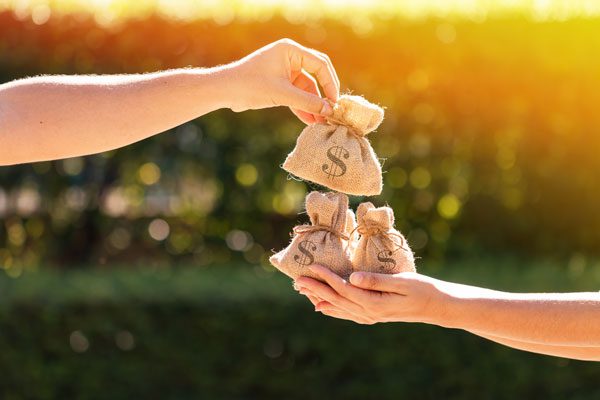
The Magic of Asking: It’s explosive and extraordinary what somebody can do when they go to the higher levels of what money is.
I want to say I have a book called Choose Bliss, ladies. Check that one out also.
In this book, this is the 20th Anniversary edition, I said, “Will you write the fourth to it?” I went through a painful, extremely expensive war. What I did is I never told Crystal who I married long ago now, but I wrote down 267 wants. What do I want? What are the characteristics, values, and virtues? When you’re sixteen years old, what do you say? “She’s got to be slim, beautiful, and eye candy.” It’s very superficial if you think about it.
“I want them super strong. I want Arnold,” or whatever you want. I wrote everything I wanted. “She’s got to like and love me. She’s got to demonstrate making her own money,” because I don’t want her marrying me for my wallet. “She’s got to be a great lover and wonderful. She’s got to be cooperative, have financial savvy and underspends below her needs. She is flexible.” We do yoga every day. She loves to dance, thinks abundance and wants to create superior memories. She’s a non-smoker, non-drinker or non-drug user, charitable, and has great etiquette.”
This is what you asked about want. Most people, “On Mondays, I want to go to work, come home, have a quick drink, go to sleep after I watch TV.” No, you want to be a dullard. What the hell would you want that for? You’re a meandering generality. All of us weren’t born in dug. We were born over in dug. You’re born of eighteen billion brains cells. You are here to use them. “I get up, have coffee, go to work, come home, drink, pee, bed. You want me to read an hour to three hours?” Not for me. You read for you.
Mark, I feel like we can talk forever. I’m going to have to have you back on this show because I want to keep talking, but I want to be respectful of your time. We’ll do it again. Does that sound good? Before we move into our three rapid-fire questions, share with us how people can get in touch with you. I know you’ve got some great gifts that you want to offer my audience.
I want everyone go AskTheBookClub.com and it’s free because Crystal, my beloved beautiful wife, which you’ll see and you’d go, “Why would she marry you?” It’s because she’s super smart. I had the goals. She had no choice. I didn’t show it to her until after we were married. Here’s the truth. I’ve got to quit goofing around here. Everybody wants a soulmate but what you really want is the higher level of that, where two lit candles come together. It’s four-fold to eigh-fold higher and that’s called a twin flame. We’re twin flames. We can mirror each other 100%, which you’ll see if you watch any of our videos on YouTube or Ask The Book Club.
I want you to go to the other one, if you’ve got a story in you and you qualify, we want to help you publish. It’s called MarkVictorHansenLibrary.com. Alexander the Great had the first one. Andrew Carnegie did 2,500 benefactors libraries in America. The media, the dumbasses and the school teacher says he’s a robber baron. He’s the biggest philanthropist ever. Now, we’re doing Library 3.0 because I want everybody in every form to have a book, audios, memorabilia, films, and all that stuff codified. I call it the road library because it’s a repository of the wealth and treasures of your mind, heart, soul, and a story of your beingness. If you go there and look through this stuff, you’d go, “I do have a story.”
I will say releasing a book is the most magical experience in the world. You’ve done 300 something. I’ve done three, but still, you impact many people each time that goes out there. You think, “It’s only my story. Like big deal.” No, your story matters because there’s someone that will read that story and it will completely change their paradigm. If it’s one, but usually, it’s many thousands of people. If you have a good publisher that gets it out there, that’s what makes the big difference.
For those that are reading and in business, it’s the best business card. It makes you the authority. Author is in the word authority. It’s the authorship of your story. People will read it and you’ll assign it to them. They’ll take your business card and put it in the cylindrical file. Nobody throws away books that are assigned to them. To the spouses and their kids, the best scientists now they’re stuck.
Mark, you also said something that I think is cute, but I do the same thing. You were like, “I read a lot of books. A lot of them are my own.” A lot of times, I’ll pick up Choose Bliss and read that and go, “That was good,” because I feel like I channeled so much of the book and so much of that wisdom happened when I was in the zone, but they don’t always live in the zone. When I read, it’s as if I’m hearing from somebody that gets me. I’m like, “That’s great.” Every once in a while, someone is like, “I need to read your book.” When you get them, I’m like, “I need to read it again too.” That’s the thing. Ladies, when you write, you capture something so deep inside you that now you have access to for the rest of your life. It’s incredible.
There’s nowhere in any spiritual literature that says you’re supposed to be small and unworthy.
Everyone has more than they think. What are we teaching in my book? You have a book in you. My seminar, you can go to MarkVictorHansenLibrary.com and all that. You don’t try to write one book at a time because then you’ll have writer’s block. Maybe three or four, you never have writer’s block and screen for things at the same time. We all have it in us. What we do is we’re teaching differently. We say, “We start with a title and then we start with a cover,” because everybody else finishes the book then tries to come up with a title. It’s wrong. Start with the title, then the cover.
When you look at our website, you’ll go, “Look at the cover that these guys are doing.” Forgive me for being a little bodacious, but I’ve come up with this cover before we did the book. I teach everyone all that stuff because everybody is a brand and you need to make your brand. Be a brand that commands.
We’re going to talk more, Mark, just so you know. Also, ladies, if you want to go and get the book, go to AskTheBookClub.com. They’re going to be doing a webinar about the book and there’s all good stuff there. Go check that out. Mark, are you ready for our three rapid-fire questions?
I’m ready.
Tell us one super tip getting started asking and receiving in your life.
Start asking yourself all day long, “What do really I want?” Write it down. We’re going to have an Ask Journal, but we’ll have you do that every day because you’re going to ask yourself like, you got bigger and better and stronger. You’ll have new apps and each app will open up different stuff.
What is one way in being successful in continuing to ask and receive in your life?
Be crystal clear about what do you want. I wanted to be a speaker who talked. I want to care about things that would make a life transformative and different. If you can, write down that as a purpose statement. For Chicken Soup, I changed the whole world one word at a time. We only did stories that were seven things. We said personal was goosebumps, chilly bumps and the second one, instantaneous behavioral change. All that stuff had to be written because once it’s codified, it’s a commandment from you to you. Metaphorically, it’s marble and it’s solid.
Mark, what would you say is one daily practice that you do that contributes to your personal success?
I make all my own decisions and think for myself. It’s easy to get swayed by other people. Somebody offered me a bunch of stock for nothing in a company called Facebook. I asked the guy who created the internet and they said, “They will never make it.” I’m never doing that again. That was a dumb idea. It’s big and bold decisions. I’m willing to live with my decisions. You’ve heard me say my failures and stuff. Nobody is 100% successful. You see a lot of financial values show up and say, “I only know how to make money. I never lose money.” Warren Buffett says, “The first rule is make money and never lose money.” He got money out of a few things. Overall, you’re going to make more money than you’ll lose.
Mark, this conversation has been amazing. Thank you so much for bringing in our New Year with your wisdom.
Thank you. My pleasure.
—
Ladies, stay tuned for EXTRA because we’ve got more. Mark is going to be talking to us about his technique for asking our higher selves, the universe, God, or whatever you want to call it, how to find out what your destiny is. What are you supposed to be doing or if you’ve got a business problem and how to get the answer to that business problem? Stay tuned for EXTRA for that. If you are already subscribed. If you’re not subscribed but would like to be, please go to RealEstateInvestingForWomenEXTRA.com. You get seven days for free, so check it out. If you love it, you get to stay in. If not, at least you’ve got some great new content.
For those of you that are leaving us, thank you so much for joining Mark and me for this portion of the show. Wasn’t it a great way to start the New Year? I had so much fun and I appreciate you. I look forward to seeing you next time. Until then, remember, goals without action are dreams, so get out there, take action and create the life your heart deeply desires.
Important Links
- Chicken Soup For The Soul
- Ask!: The Bridge From Your Dreams To Your Destiny
- Dr. Peter Diamandis
- Choose Bliss
- Natural Power Concepts
- How to Think Bigger Than You Ever Thought You Could Think
- Stand Up, Speak Out, and Win
- Guinness Book of Records
- The Miracle of Tithing
- Who is the Boss of You?
- RealEstateInvestingForWomenEXTRA.com
About Mark Victor Hansen

Mark Victor Hansen is an American inspirational and motivational speaker, trainer and author. He is best known as the founder and co-creator of the Chicken Soup for the Soul book series.
Love the show? Subscribe, rate, review, and share!
______________________________________
To listen to the EXTRA portion of this show go to RealEstateInvestingForWomenExtra.com
To see this program in video:
Search on Roku for Real Estate Investing 4 Women or go to this link: https://blissfulinvestor.com/biroku
On YouTube go to Real Estate Investing for Women
Moneeka Sawyer is often described as one of the most blissful people you will ever meet. She has been investing in Real Estate for over 20 years, so has been through all the different cycles of the market. Still, she has turned $10,000 into over $5,000,000, working only 5-10 hours per MONTH with very little stress.
While building her multi-million dollar business, she has traveled to over 55 countries, dances every single day, supports causes that are important to her, and spends lots of time with her husband of over 20 years.
She is the international best-selling author of the multiple award-winning books “Choose Bliss: The Power and Practice of Joy and Contentment” and “Real Estate Investing for Women: Expert Conversations to Increase Wealth and Happiness the Blissful Way.”
Moneeka has been featured on stages including Carnegie Hall and Nasdaq, radio, podcasts such as Achieve Your Goals with Hal Elrod, and TV stations including ABC, CBS, FOX, and the CW, impacting over 150 million people.
Financial Freedom And Bliss With Caterina Rando – Real Estate Women
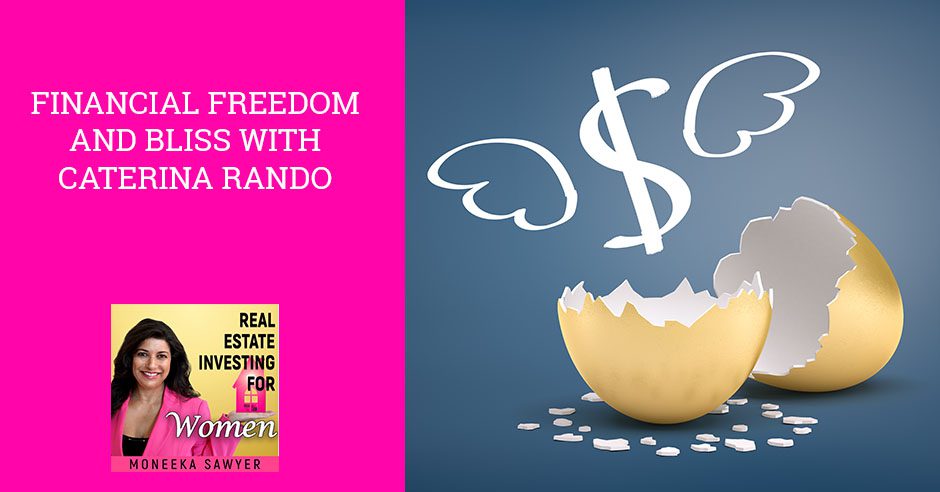
You deserve to enjoy your life, but sometimes, you just can’t feel that sense of fulfillment no matter how hard you try. You could not get the feeling of ultimate happiness you’ve always dreamed of because of different circumstances or tragedies. So, it’s time to explore the possibilities. In this episode of Expand Your Fempire with Caterina Rando, Moneeka Sawyer shares the key things that helped her overcome the challenges and trials in her life that made her stronger, braver, and wiser. As Monica attains financial freedom and wealth, it helps her reach her goals and experience bliss in her life. Tune in to learn how to acquire yours!
—
Listen to the podcast here
Financial Freedom And Bliss With Caterina Rando – Real Estate Women
Real Estate Investing For Women
As you might imagine, as a podcaster, I am often invited to be on other people’s shows, which I love. It is such an honor and it is so much fun. Every once in a while, I am on a show that is so good. We cover stuff that I haven’t covered elsewhere and sometimes I want to share those conversations with you. This conversation that I had with a good friend of mine, Caterina Rando, is one of those conversations. I thought this might be exactly what you need as we were heading into the New Year, so I wanted to share it with you. Here is the episode with me and Caterina. I hope you enjoy it.
—
Welcome back to another episode of the Expand Your Fempire Show. I am extra blissing to be with you because I have the Blissful Millionaire, Moneeka Sawyer, as my very special guest on this episode. She is a dear friend, a TEDx speaker and a real estate mogul. What I want you to know about Moneeka is that she embodies bliss and lights up every room she walks into. You cannot be with her and not leave blissing. Moneeka, thank you for being here.
Thank you so much for having me. You made me blush. That was so cool.
We have been to Hawaii and on other adventures together. You are always so wonderful to be with. You are a leader. You don’t just teach about bliss and you not only live your bliss, but you bliss every room that you are in. I am so happy to have you. Let me have you share a little bit about your entrepreneurial journey because you are living an amazing life. You travel all the time and you have financial freedom. How did you get from that blissing little girl to where you are?

Financial Freedom: Bliss is that deep sense of joy and contentment with life so that you know that anything that comes your way, you can handle it emotionally.
Thank you so much for asking that. It is a journey that is a little bit unexpected. It is not something people would expect to hear from me when they meet me. I was not a blissing little girl. I was a tormented, bullied little girl because I lived in what you might call a Lily-White community in Ohio and was the only person that was not White. I’m Indian so I got bullied and treated very badly. From a very young age, my journey, passion, and the thing that I focused on most were how was I going to be happy because people were not kind. I was like, “Could I be happy?” That journey towards bliss started as a very young girl trying to survive and figure out how to be happy.
The journey went on for many years. We have eventually moved to California, but things didn’t get much better. In high school and college, I became a people-pleaser. I wanted to make other people happy because I thought other people being happy would make me happy if they liked me. How many of us girls can relate to that? We were like, “If they like me, I will be happy.” Horrible bullying happened were things that boys do to girls happened. Eventually, I left for college and found that no matter how hard I tried, it didn’t get better. I put my strong face forward. I always had a big smile. I was always the nicest person in a room and people were so unkind.
The one thing that kept me sane through most of my life was I was a dancer. I started dancing when I was five. All of you ladies know exercise helps with the endorphins, our confidence and keeping us strong. Plus, I loved it, so it was my anchor throughout my entire life. I got in this car accident when I was 21. I became a cripple and lost my legs.
I did not lose them but I couldn’t use them anymore, so I even lost dance. At that point, I fell into such an incredible depression. I wanted it to be over. I had been depressed and in bed crying for a week. I remember one morning, I woke up and I heard my mom’s voice in my head. My mom says, “Moneeka, get out of bed. Get some air so you will feel better.” I pushed the covers over my head, swung my legs over the side of the bed and tried to stand up. My legs were so weak that I fell to the ground.
At that moment, I sat there crying and prayed. I said, “God, I can’t keep doing this, so either bring me home or teach me how to live.” About an hour later, a girlfriend called me, who I hadn’t heard about for years. I tell her frequently that God sent her to me at that moment. She turned me on to a coach and that coach is the man that saved my life because he taught me that we are all born in these little blissful bundles of joy. We come into the world so full of excitement of being alive, learning, and experiencing. We were blissing, and then life teaches us that it is hard and bliss is okay. He told me that my journey and all the study that I had done were going to serve me. He was going to help me get back to where I needed to go, and so we did.
It all starts with the decision. I wrote a book called Choose Bliss, and the reason I say choose bliss is because it always starts with a choice. Bliss is a choice and it started with a choice. It didn’t mean that the journey was easy, but it meant that the journey started, I was committed to it, and therefore, it could happen. That is how the whole bliss thing started for me.
We are all born in these little blissful bundles of joy. We come into this world full of the excitement of being alive, learning, and experience.
The first thing you did with your coach, did you choose bliss? Was that the first step?
I chose to live, which was not the first step and then the next choice was to try to find happiness. At that time, it was this very basic, “I didn’t want to be miserable.” Sometimes, the first step is to not be something. As we worked together, I expanded so great because it was truly in my heart to experience bliss. Also, I want your audience to know how I define bliss. Bliss is not being happy all the time. Bliss is that deep sense of joy and contentment with life so that you know that anything that comes your way, you can handle it emotionally. It is emotional mastery and resilience. That wasn’t where I started but that is where I wanted to go.
He hired me on as an executive coach underneath him and I found that there were all these people that I worked with that were multi-millionaires. I would go into their offices. They had a great job and a beautiful wife. At that time, all the executives were men. They have these beautiful children and beautiful homes in the Silicon Valley but they were miserable, so I became the Bliss Coach.
I took what I had learned through my own experience and taught them how to bring their passion, motivation and bliss back into their lives. I could only reach so many people in coaching or speaking, so I wrote a book called Choose Bliss. That is where I grounded this idea of bliss, where I defined what we were looking for and the specific steps on how to get there based on my experience with myself and my clients.
You know that I am a huge fan of focusing on bliss and I host the Bliss Retreat, which I’m looking forward to. For someone reading who wants more bliss and does not have it, let’s keep it out of business. We are going to go to business shortly. How do they bliss more in their life? What tips do you have for them?
I have already said that it is a choice and I know that sounds trite. We hear this all the time. I want to be clear. Learn from what has happened to me. There has been abuse and a lot of horrible things that have happened in my life. The thing that I realized is that I was not going to be able to be a happy person unless I was willing to get past that somehow. The very first thing is to understand that bliss is a choice and here is the next piece of that. We can’t control what happens out there in the world. We can’t control other people, what happens to us or what people do to us, but we must always control how we choose to respond. That is the ultimate key to living a life of bliss. That is the start. After that, we have got some techniques. There are many in the book, so take a look at it.
I do tend to agree about choosing bliss. What I also have seen and know is that for women entrepreneurs who are the women that I focus on and our key audience here, one thing that can impact your bliss is when you are struggling financially. You are concerned about whether you can pay your bills and if you can deliver what you promised to your clients because your financial situation is challenging.
People may be in that situation. What I also know about you is that you have created financial freedom for yourself. I would like to shine the spotlight a little bit on that because that is a place where you are like, “I choose bliss but if I can’t pay my bills, it is hard to keep choosing bliss for a lot of people.” Can you talk a little bit about your financial freedom journey? Let’s give some super tips to our audience.

Financial Freedom: We can’t control what happens out there in the world, and we can’t control other people, but we can control how we choose to respond.
That is what my TEDx is about. My TEDx is called Who is the Boss of You? It is about living a life of choice. At the age of 21, when I got out of school and looked for my first job, I was lucky enough to recognize that if I wanted to be free, marry the man that I wanted, and have the life that I wanted or be able to live in choice. I had to have the financial wherewithal to make that happen, so I wasn’t desperate to get married, get a job or sell myself into society. For me, it became this journey very early on that financial freedom was the key to my freedom and choice in life.
It is interesting because part of why TED wanted me to talk about this is because it is so controversial. People do not want to recognize that money is an important piece of freedom. It is not necessarily happiness, but freedom often leads us to happiness. Money buys us freedom. Freedom buys us choices. Choices can buy us happiness. For me, my big focus is empowering women so that they understand that they need to focus on money.
It is not the most important thing in the world but it is certainly important, and a lot of women want to ignore it or turn their back on it. They feel somehow wrong if they are focusing on the money. I will back up a little bit and say that you don’t want to be selling services to someone that they don’t need. Money is a king but money should be the thing that sets your foundation so that you can be of service in the biggest, best way possible.
For me, I found that I did that through real estate. I had my businesses and I was in corporate. My side hustle was real estate. Even in the very beginning or when I wasn’t wealthy, the one thing that I knew was I would always be okay because I had this asset. Whether the bills were bothering me or what was going on, I knew that I was always going to be okay. As that asset grew and I grew that side hustle that I paid very little attention to, the freedom came within 10 to 15 years. I knew that I would never have to worry about money, so whether I was coaching, speaking, or whatever it was that I was doing, I didn’t have to struggle to make money. I knew I was taking care of it. I could do what I felt was right and give my very best.
Freedom often leads us to happiness, but money buys us freedom. Freedom buys us choices, and choices can buy us happiness.
I want to jump back for a second, Moneeka. We need to shine the spotlight that women can make a living or a business doing what they love that may or may not be their source of wealth. I also have some real estate and I call it my old lady money because I believe that as long as I can give a talk, I can come home with clients. There may also be a day when I can’t give a talk or I don’t want to come home with clients. That is what my real estate is for. It does provide this feeling of security and the feeling of knowing that you are going to be okay financially, thus giving us more freedom. Real estate is not the only solution.
I do emphasize with my clients the importance of creating financial surplus and looking at how to create financial surplus so that they are okay with those things that are unexpected. I do feel that a lot of women who don’t value money as a high value have their attention on serving and helping, which is great. We want to be sure, though, that we were filling our cup first so we were not trying to give from an empty cup, and therefore, we can also be enjoying our journey more. What are your thoughts?
I want to highlight that. You cannot pour a cup of tea out of a pot if the pot is empty. Your life is that cup and what is inside you is the tea. You’re the pot. If you are empty, there is nothing to give. You can go out there, keep trying and pushing, but that is why we have sickness and disease, why women get very depressed and on medications because we were not taking care of ourselves. This is not just a trite talk about self-care and building yourself up. It is real. The most courageous thing that we can do is to take care of ourselves. People think it is the opposite. You take care of others and then that takes care of you.
As women, we do get so much from giving to others. It does feed us but remember, you are first because if there is nothing left in you, there is nothing left to give. It does matter financially. Part of filling yourself up is making yourself feel safe, taking care of your bills, and making sure that everything is paid so that you can be solid in the world that you are safe because that matters. Women don’t want to pay attention to that. Money has gotten a stigma. That is what I think but it’s not. It is a girl thing too. We need the money to make our lives work, safe and stable.
Moneeka, you have been kind enough over the years to support our charities through the community. We have our charities that support women and girls. You have organizations that you are involved with supporting youth and education. When we take time away from our business to do our philanthropy, we can’t do that consistently if we are struggling. One of the things that financial ease does is it gives you a choice to take some of your time and invest that time in the causes that you care about, and that has been extremely rewarding.
I remember one day I was sitting in traffic near the Bay Bridge in the Bay Area. I was high vibration blissing in my car even though I was in traffic because we had raised $10,000 for one of our charities. Another way to bliss in your life is when you are helping other people. You are not able to do that consistently when you do not have financial ease.
The other thing, though, is that during the pandemic, I haven’t been able to kiss or hug all my ladies. As a result, I have been sending them cards and note cards. We have made this bliss roll-on aromatherapy that we gave everybody. I have spent so much money on postage, and fortunately, everybody knows I have a crush on my mailman, Antonio, who gives me excellent service.
Here is the thing. You can’t do all those little special things when you are stressed financially. The other thing is it impacts your ability to think about the future and what possibilities you can create for yourself in your life when you have no resources. I love what you were saying that when you have financial freedom, it gives you a choice for your whole life. That is what we want for our audience. Moneeka, let’s talk to the audience. They are reading and saying, “I get it.” What steps do we want them to take?

Financial Freedom: You cannot pour a cup of tea out of a pot if the pot is empty. Your life is that cup and what’s inside you is the tea. If you’re empty, there’s nothing to give.
First, decide if both of these pieces are important to you. We have been talking about bliss and wealth. It does start with a choice. Choose that it is important for you. It is a choice and it starts as simple as that. The first thing is you are going to have a relationship with the joy in your life and with money that brings you joy. That is why I call myself the Blissful Millionaire because the focus is on keeping even the conversation about money joyful. It supports all that bliss in my life not just by giving me freedom, but the actual process is a blissful one.
The next step is to find one little step in each of those areas that you can take. Don’t allow it to be overwhelming. You can eat a big chocolate cake but it takes one bite at a time. What is that bite going to be on the bliss side and also on the wealth side? Beginning steps should have something to do with your relationship, those ideas in your own life, and the role that they play for you. Make a decision, find what that first step is, and then take that first action towards achieving that first step.
You have a way of making me feel like there are so many possibilities. You have shared with our audience your phenomenal book, Choose Bliss, which I highly recommend. How can everyone connect with you? Is there any excitement that you want to share that you are up to?
Go to BlissfulInvestor.com. You will find all my books there and my show, Real Estate Investing for Women. If you are interested a little bit, peaked on that. We have a blog. You will find out all kinds of information there. I did a TED Talk called Who is the Boss of You? It is about this journey of financial freedom to creating a blissful life so you can look that up. It is on TED.com under Moneeka Sawyer. I will eventually have it loaded up on my website. That is what’s been going on.
You bliss every conversation that you are in. You bliss me out to be with you. Readers, we want you to have more bliss in your business and life. Choose bliss, get more bliss and do that through selling more, serving more, and the thing that will bliss you out the most uplifting more lives.
Important Links
- Caterina Rando
- Moneeka Sawyer
- Choose Bliss
- Bliss Retreat
- Who is the Boss of You?
-
Real Estate Investing for Women – Moneeka Sawyer’s Podcast
About Caterina Rando
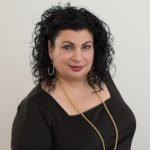
Caterina Rando is a master certified coach, business strategist and author of the national best-seller Learn to Power Think from Chronicle Books 2002. Caterina is also the creator of two live events, The Sought After Speaker Summit and the Business Breakthrough Summit.
Love the show? Subscribe, rate, review, and share!
______________________________________
To listen to the EXTRA portion of this show go to RealEstateInvestingForWomenExtra.com
To see this program in video:
Search on Roku for Real Estate Investing 4 Women or go to this link: https://blissfulinvestor.com/biroku
On YouTube go to Real Estate Investing for Women
Moneeka Sawyer is often described as one of the most blissful people you will ever meet. She has been investing in Real Estate for over 20 years, so has been through all the different cycles of the market. Still, she has turned $10,000 into over $5,000,000, working only 5-10 hours per MONTH with very little stress.
While building her multi-million dollar business, she has traveled to over 55 countries, dances every single day, supports causes that are important to her, and spends lots of time with her husband of over 20 years.
She is the international best-selling author of the multiple award-winning books “Choose Bliss: The Power and Practice of Joy and Contentment” and “Real Estate Investing for Women: Expert Conversations to Increase Wealth and Happiness the Blissful Way.”
Moneeka has been featured on stages including Carnegie Hall and Nasdaq, radio, podcasts such as Achieve Your Goals with Hal Elrod, and TV stations including ABC, CBS, FOX, and the CW, impacting over 150 million people.





